Renewable Energy Sources
14 Green Benefits of Heating With Renewable Energy Sources
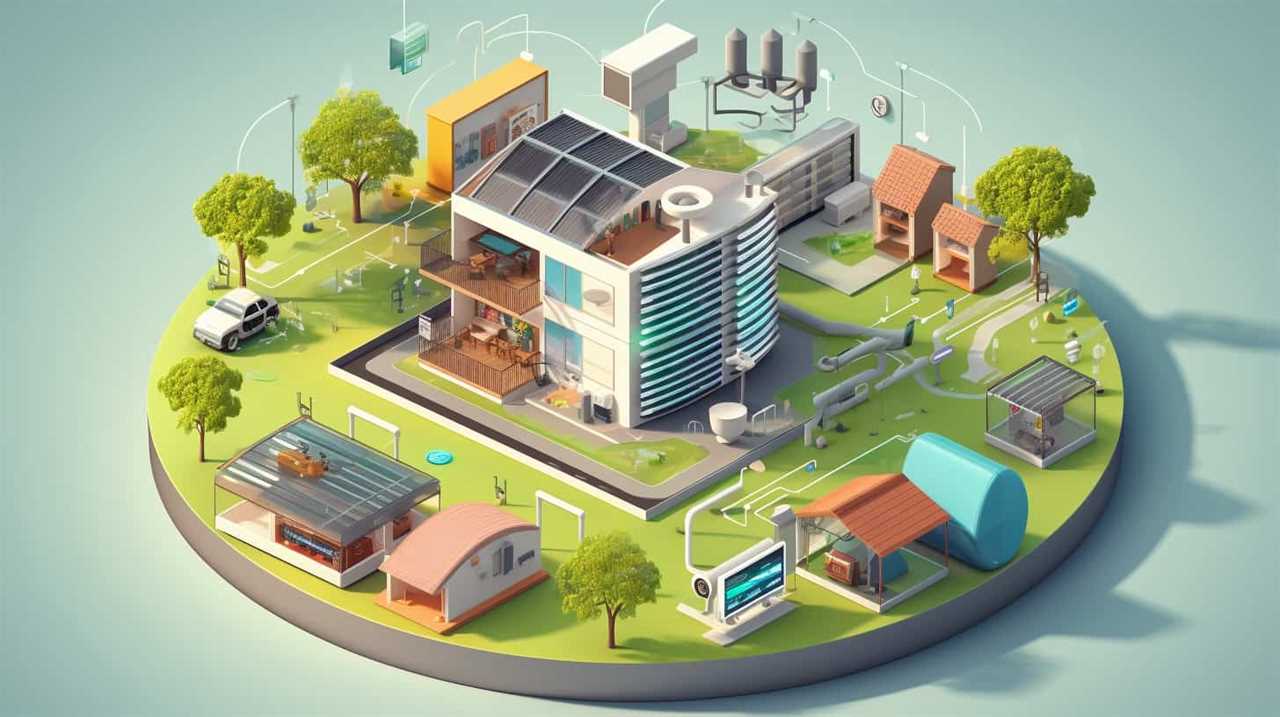
Ready to transform your home heating system? Search no more!
In this article, we will unveil the 14 green benefits of heating with renewable energy sources. By making this switch, we can significantly reduce carbon emissions, lower energy costs, and enhance our home value.
With a diverse range of renewable options available and potential government incentives, the possibilities are endless.
Join us as we explore the innovative world of renewable energy heating.
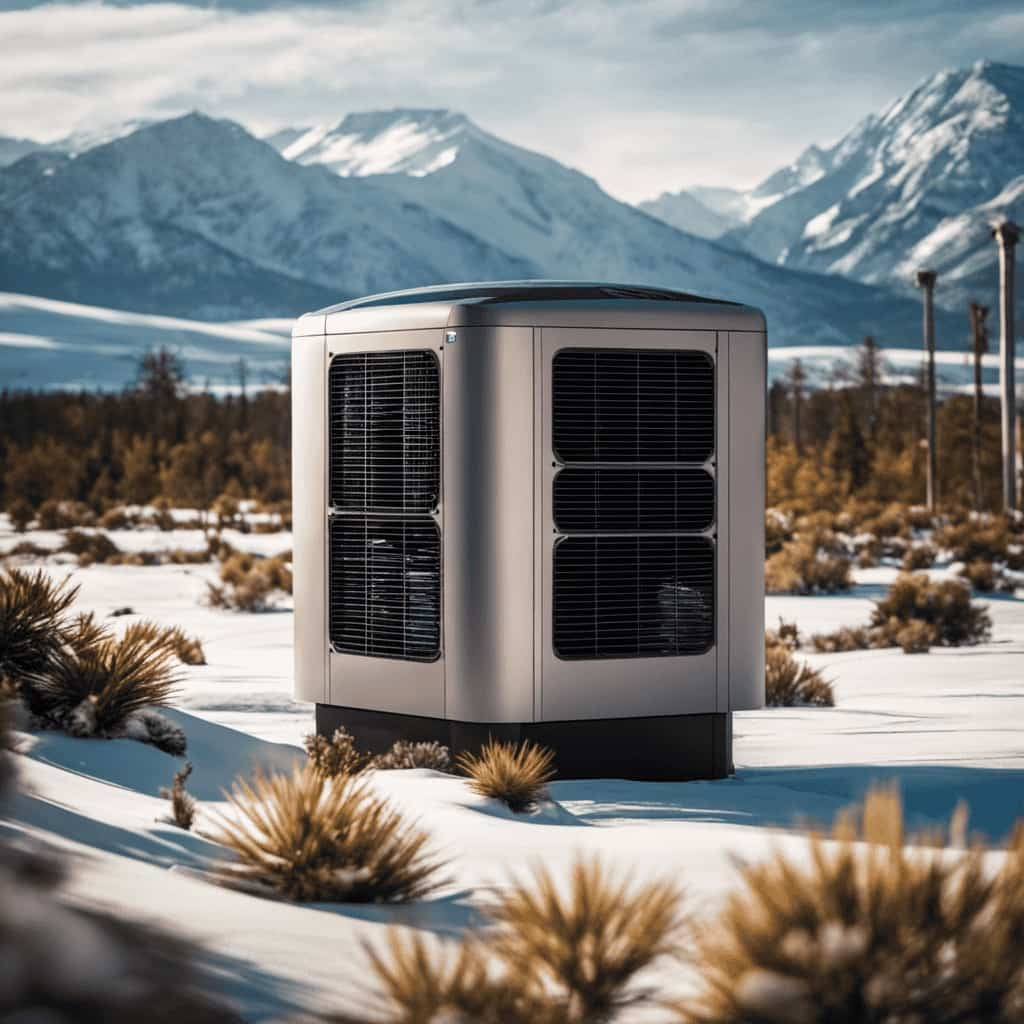
Key Takeaways
- Utilizing renewable energy sources for heating reduces carbon emissions and mitigates climate change.
- Heating with renewable energy sources can result in lower energy costs and provide long-term cost savings.
- Using renewable energy sources improves air quality, reduces respiratory illnesses, and contributes to overall well-being.
- Utilizing renewable energy sources for heating reduces dependence on fossil fuels, promotes energy independence, and stimulates economic growth.
Reduced Carbon Emissions
We can achieve a significant reduction in carbon emissions by utilizing renewable energy sources for heating.
Energy conservation is crucial in mitigating climate change, and transitioning to renewable energy is one of the most effective ways to achieve this goal.
According to a study conducted by the International Renewable Energy Agency (IRENA), heating accounts for approximately 40% of global energy consumption and is responsible for a significant portion of carbon emissions.
By using renewable energy sources such as solar panels, geothermal heat pumps, and biomass boilers, we can drastically reduce our carbon footprint. For example, replacing traditional fossil fuel-based heating systems with solar thermal systems can lead to carbon emissions reductions of up to 70%.

These renewable energy options not only reduce carbon emissions but also provide a sustainable and long-term solution for heating needs.
Energy Efficiency
By improving the energy efficiency of our heating systems, we can reduce energy waste and lower our carbon footprint. One way to achieve this is by using energy efficient appliances. These appliances are designed to consume less energy while still providing the same level of performance. They often include features like programmable thermostats, which allow us to set specific temperatures for different times of the day, reducing unnecessary heating. Another important factor in energy efficiency is building insulation. Proper insulation helps to keep the heat inside our homes, reducing the need for constant heating. Insulating materials, such as fiberglass or cellulose, can be installed in walls, roofs, and floors to prevent heat loss. Investing in energy efficient appliances and building insulation not only saves us money on energy bills but also contributes to a more sustainable future.
| Energy Efficient Appliances | Building Insulation |
|---|---|
| Consumes less energy | Reduces heat loss |
| Programmable thermostats | Keeps heat inside |
| Saves money on energy bills | Contributes to sustainability |
Lower Energy Costs
When it comes to heating our homes, lower energy costs are a significant advantage of using renewable energy sources. By utilizing solar panels or geothermal systems, homeowners can save money on their heating bills in the long run.
According to data, heating with renewables can result in substantial financial savings and provide eco-friendly heating options for a more sustainable future.

Financial Savings From Renewables
Switching to renewable energy sources can lead to significant financial savings by lowering energy costs. Not only are renewable energy sources more sustainable and environmentally friendly, but they also offer financial incentives and a high return on investment.
By harnessing the power of solar, wind, or geothermal energy, homeowners can reduce their reliance on traditional fossil fuels and take advantage of government incentives such as tax credits and rebates. Additionally, renewable energy systems have a longer lifespan and require less maintenance compared to traditional heating systems, further reducing costs in the long run.
These financial benefits make renewable energy an attractive option for those who desire innovation and want to reduce their carbon footprint.
Now, let’s explore the various eco-friendly heating options available.

Eco-Friendly Heating Options
Exploring eco-friendly heating options can lead to lower energy costs while reducing our carbon footprint. By adopting eco-friendly heating technologies and renewable energy solutions, we can make significant strides towards a more sustainable future.
Here are two sub-lists that paint a picture of the available options:
Eco-Friendly Heating Technologies:
- Geothermal heat pumps: These systems use the stable temperature of the earth to provide heating and cooling, reducing energy consumption by up to 50% compared to traditional systems.
- Solar thermal systems: By harnessing the power of the sun, these systems can heat water or air, providing an efficient and renewable source of warmth.
Renewable Energy Solutions:
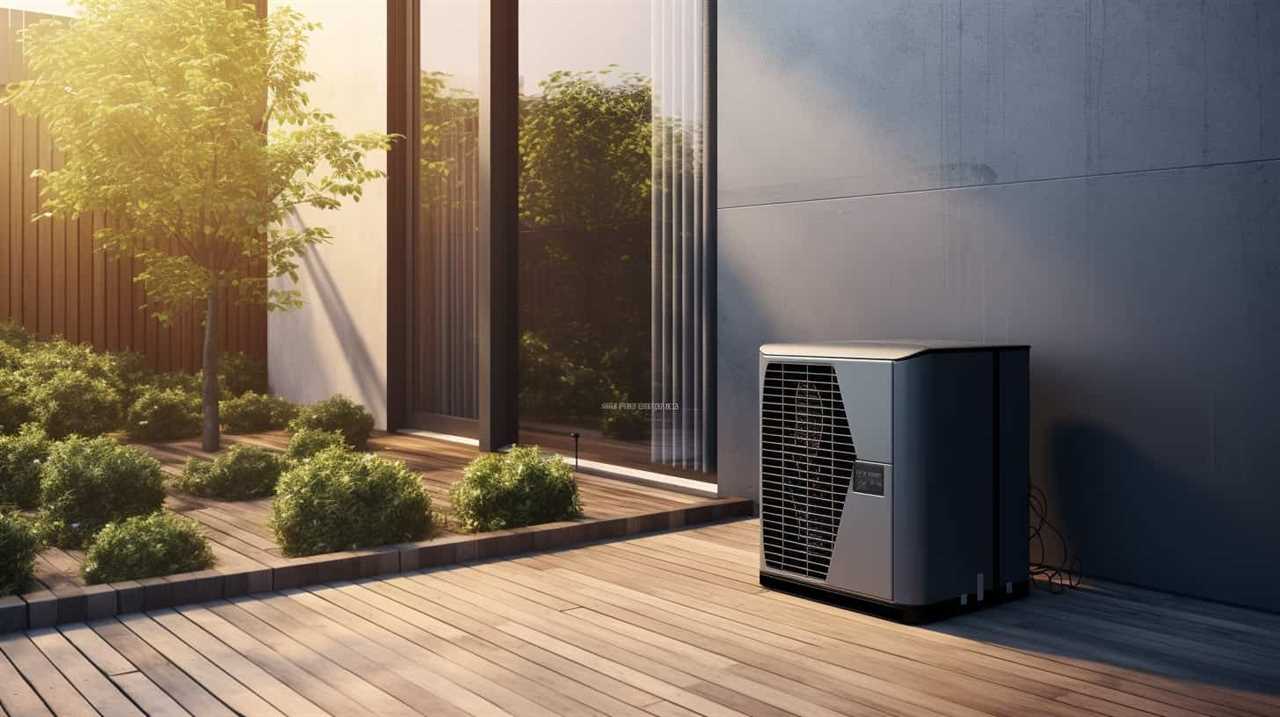
- Biomass boilers: These burn organic materials like wood pellets or agricultural waste to generate heat, reducing reliance on fossil fuels.
- Heat pumps: Air source or ground source heat pumps transfer heat from the environment to warm our homes, using minimal electricity.
Transitioning to these eco-friendly heating options not only lowers energy costs but also sets the stage for our discussion on renewable and sustainable energy sources.
Renewable and Sustainable Energy Source
Renewable and sustainable energy sources play a crucial role in mitigating the environmental impact of our energy consumption. By utilizing renewables such as solar, wind, and geothermal power, we can significantly reduce greenhouse gas emissions and combat climate change.
Additionally, investing in renewable energy sources ensures long-term energy sustainability, as these resources are naturally replenished and don’t deplete over time.
Environmental Impact of Renewables
We have identified three key environmental impacts of utilizing renewable and sustainable energy sources for heating:

-
Reduction in greenhouse gas emissions: By adopting renewable energy sources such as solar, wind, and geothermal for heating, we can significantly reduce our dependence on fossil fuels. This shift helps to mitigate climate change by decreasing greenhouse gas emissions, which are a major contributor to global warming.
-
Preservation of natural resources: Renewable energy adoption promotes environmental conservation by conserving finite resources like coal, oil, and natural gas. Since renewable energy sources are replenishable, their use for heating minimizes the depletion of these valuable resources, ensuring their availability for future generations.
Transitioning to renewable and sustainable energy sources for heating not only addresses immediate environmental concerns but also lays the foundation for long-term energy sustainability. By embracing cleaner alternatives, we can work towards a future that’s both environmentally friendly and economically viable.
Long-Term Energy Sustainability
For long-term energy sustainability, we must prioritize the adoption of renewable and sustainable energy sources for heating. Renewable energy adoption is crucial in ensuring a clean and reliable energy future.
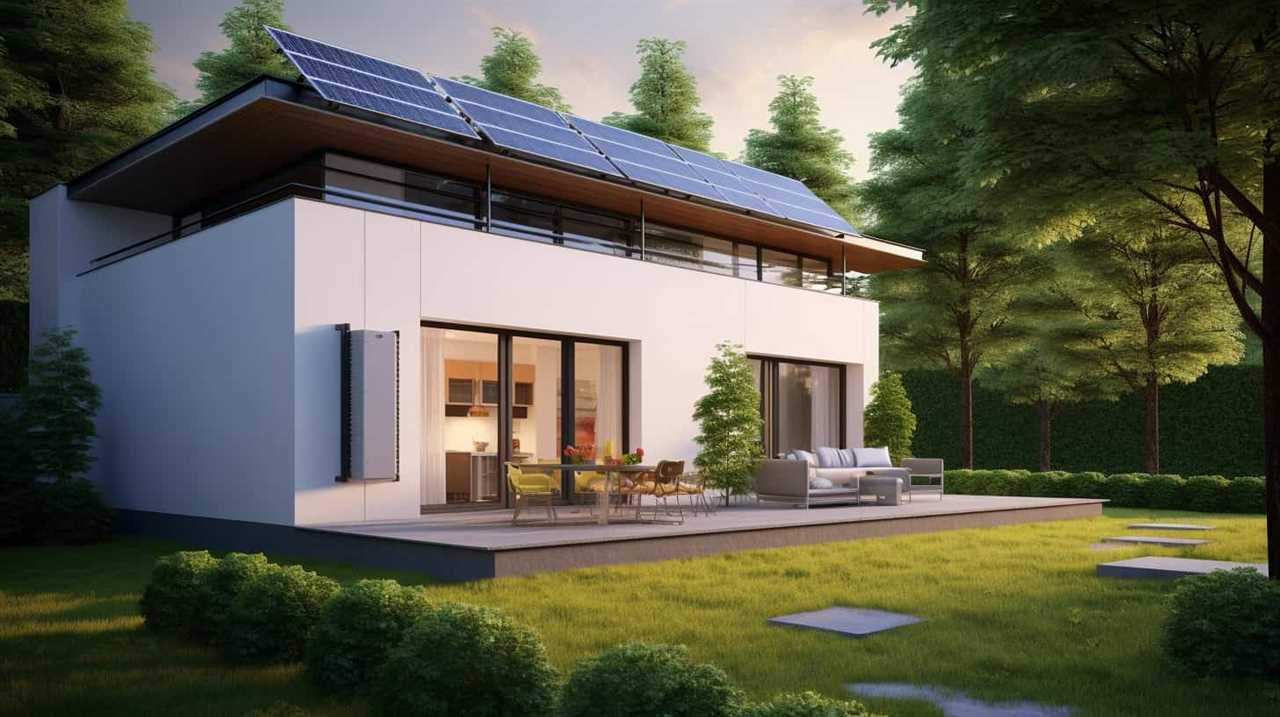
One key aspect of long-term energy sustainability is the development of efficient long-term energy storage solutions. Currently, one of the challenges with renewable energy sources is their intermittency, as they rely on factors like sunlight and wind. To address this, advancements in long-term energy storage technologies are necessary.
These storage solutions can store excess energy during times of high renewable energy production and release it when needed, ensuring a continuous and reliable energy supply. By investing in and developing these technologies, we can maximize the benefits of renewable energy adoption and pave the way for a sustainable energy future.
Reduced Dependence on Fossil Fuels
By utilizing renewable energy sources for heating, we can significantly reduce our dependence on fossil fuels. This shift towards sustainable heating alternatives offers several benefits, including:
-
Reduced fuel consumption:
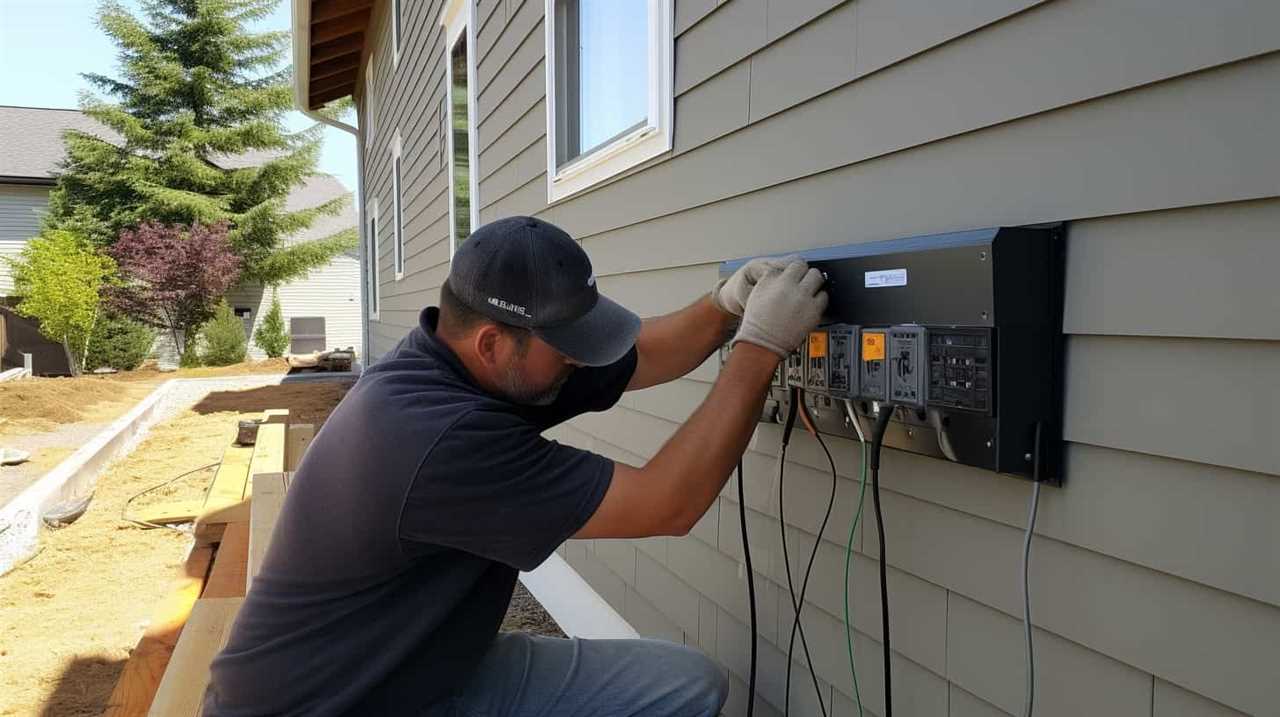
-
Renewable energy sources such as solar panels and geothermal heat pumps require little to no fuel to operate, reducing our reliance on fossil fuels.
-
These systems harness the power of natural resources like the sun and the earth’s heat, providing an abundant and renewable source of energy.
-
Sustainable heating alternatives:
-
Biomass boilers and heat pumps are examples of sustainable heating alternatives that use organic materials or electrical energy to generate heat.

-
Biomass boilers burn wood pellets or agricultural waste, which can be continuously replenished, making them a sustainable choice.
Improved Air Quality
When it comes to heating our homes with renewable energy sources, one of the key benefits is improved air quality.
By using renewable energy sources such as solar or geothermal power, we can reduce the emissions of harmful pollutants that are released when burning fossil fuels.
This leads to healthier indoor environments and a significant decrease in respiratory illnesses caused by poor air quality.
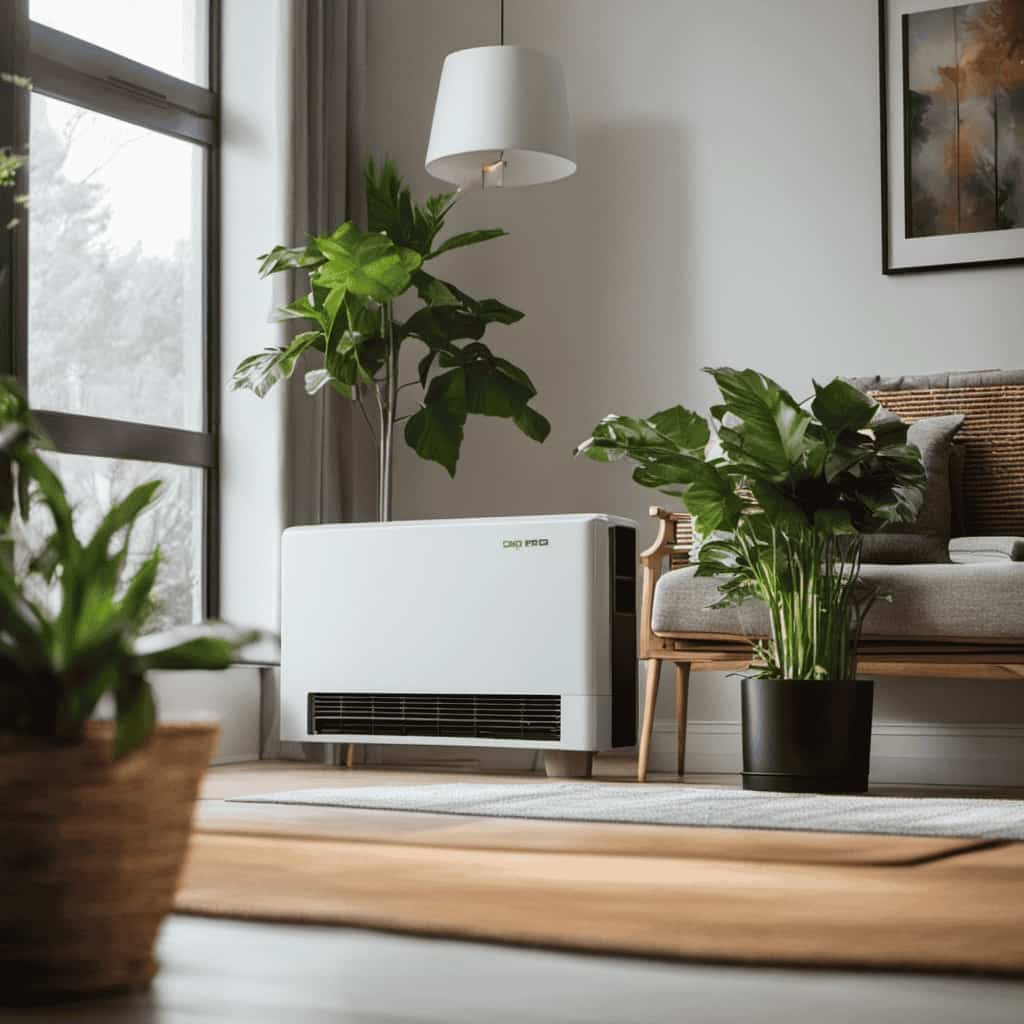
Healthier Indoor Environments
We can breathe easier and enjoy a healthier indoor environment through the use of renewable energy sources for heating, which improves air quality. Here are some ways in which renewable energy contributes to our improved well-being:
-
Reduction in air pollutants: Renewable energy sources such as solar and geothermal heating systems produce little to no emissions, unlike traditional fossil fuel-based heating systems. This means less exposure to harmful pollutants such as carbon monoxide, nitrogen dioxide, and particulate matter, which can cause respiratory problems and other health issues.
-
Minimized indoor allergens: Renewable energy options like geothermal heat pumps eliminate the need for combustion processes, reducing the presence of indoor allergens like dust, pollen, and mold spores. This is particularly beneficial for those with allergies or asthma, as it helps create a cleaner and healthier indoor environment.
Transitioning into the subsequent section about ‘reduced respiratory illnesses’, it’s evident that the use of renewable energy for heating not only improves air quality but also has significant health benefits.

Reduced Respiratory Illnesses
The improved air quality resulting from heating with renewable energy sources reduces respiratory illnesses. By using renewable energy sources such as solar, wind, or geothermal power for heating, we can significantly reduce the emissions of harmful pollutants that are typically released by traditional heating systems.
These pollutants, such as particulate matter, nitrogen dioxide, and sulfur dioxide, are known to have detrimental effects on lung health. Studies have shown that exposure to these pollutants can lead to respiratory conditions such as asthma, bronchitis, and even lung cancer. By transitioning to renewable energy sources, we can improve lung health and reduce the risk of respiratory illnesses.
Cleaner air quality is essential for maintaining a healthy indoor environment and ensuring the well-being of individuals.
Decreased Environmental Impact
Our transition to renewable energy sources significantly reduces our environmental impact. By adopting sustainable heating solutions, we can achieve enhanced energy conservation and contribute to a cleaner planet. Here are two important ways in which renewable energy decreases our environmental impact:
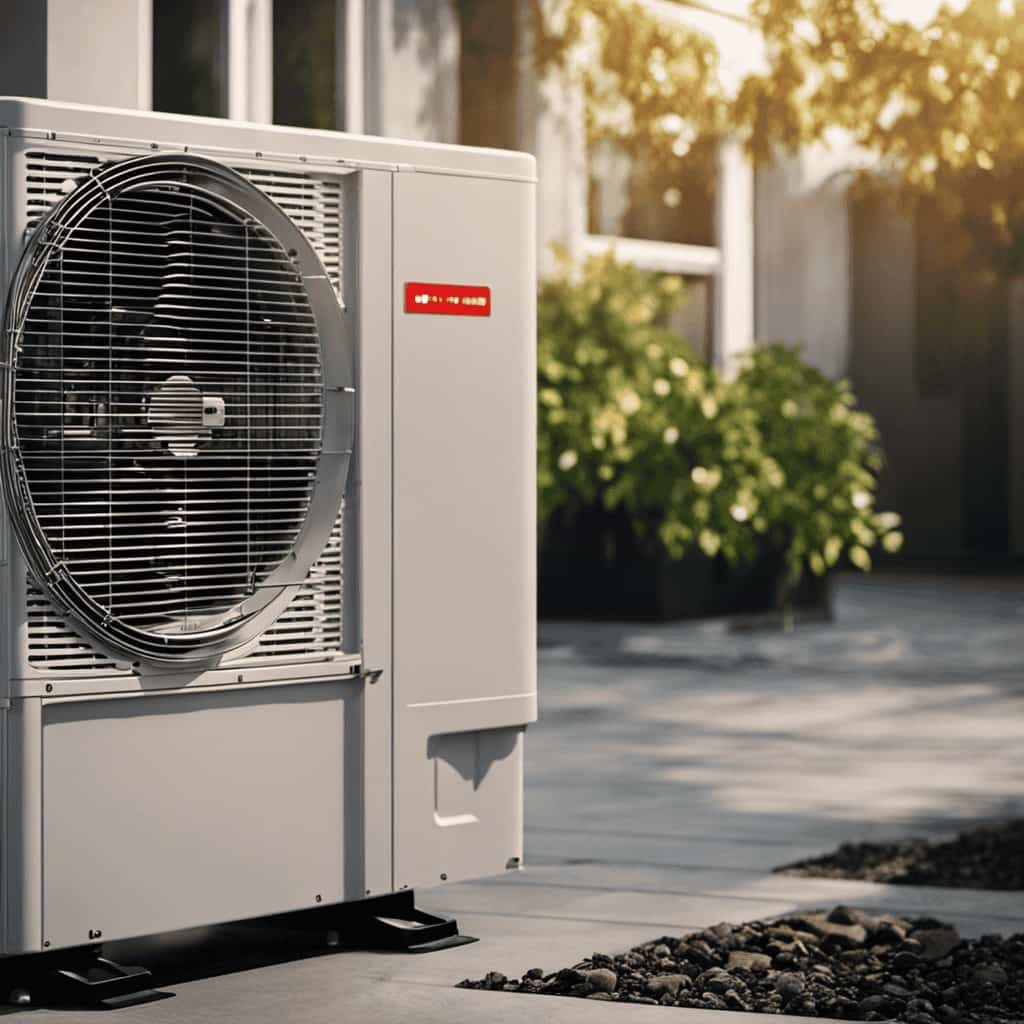
-
Reduced carbon emissions: Traditional heating methods such as fossil fuel combustion release harmful greenhouse gases into the atmosphere, contributing to climate change. Switching to renewable energy sources like solar and geothermal heating systems greatly reduces carbon emissions, helping to mitigate global warming.
-
Preservation of natural resources: Renewable energy relies on sources like sunlight, wind, and heat from the Earth, which are naturally replenished. By utilizing these sources for heating, we reduce our dependence on finite resources like coal and oil. This not only saves valuable resources but also helps protect ecosystems and habitats from the destructive processes associated with resource extraction.
Through our transition to renewable energy sources, we can make a significant positive impact on the environment, paving the way for a more sustainable future.
Long-Term Cost Savings
When considering the benefits of heating with renewable energy sources, one of the key advantages is the potential for long-term cost savings. By using renewable energy, such as solar or geothermal heating systems, homeowners can significantly reduce their energy bills over time.
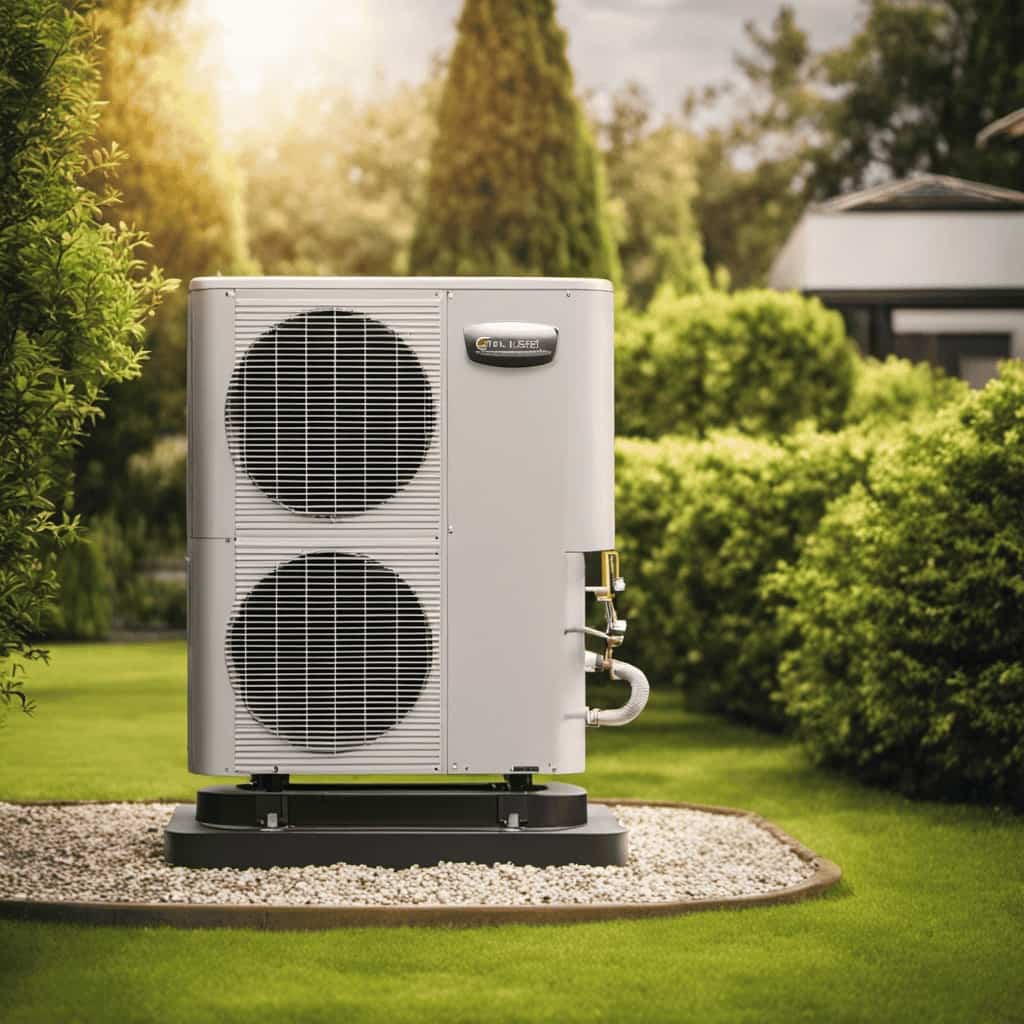
This financial sustainability not only provides immediate relief to household budgets but also contributes to long-term economic advantages, as energy costs continue to rise.
Lower Energy Bills
We can achieve significant long-term cost savings by using renewable energy sources for heating, resulting in lower energy bills.
Here are a few ways in which this can be achieved:
-
Energy Efficient Appliances:
By investing in energy-efficient heating appliances, such as heat pumps or biomass boilers, you can reduce your energy consumption and lower your heating costs. These appliances are designed to use less energy while providing the same level of comfort. Upgrading to energy-efficient appliances not only reduces your carbon footprint but also saves you money in the long run by cutting down on energy consumption.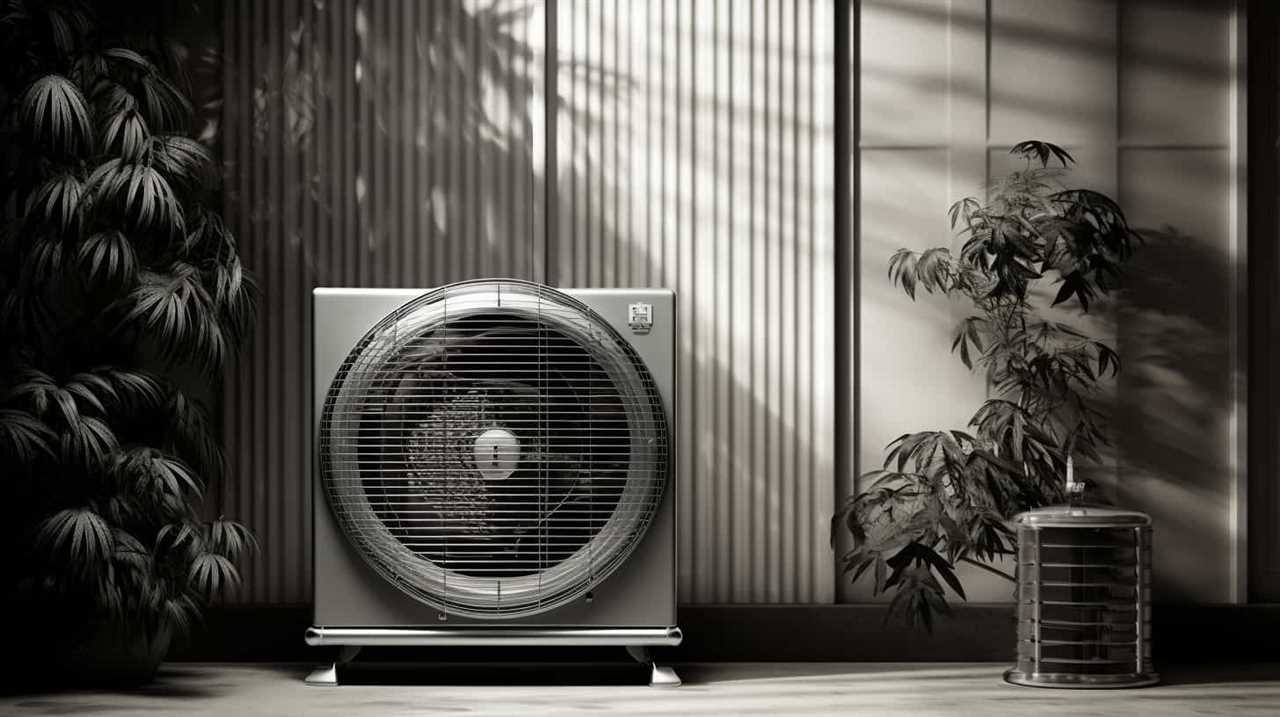
-
Smart Home Technology:
Smart thermostats and home automation systems allow you to optimize your heating usage. These technologies can learn your preferences and adjust the temperature accordingly, ensuring that you only heat your home when needed. By integrating renewable energy sources with smart home technology, you can further maximize your energy savings and reduce your energy bills.
Financial Sustainability
Using renewable energy sources for heating can lead to significant long-term cost savings. Not only are these sources environmentally friendly, but they also offer financial stability and sustainable investments. When comparing renewable energy options to traditional heating methods, the long-term savings become clear. Take a look at the table below, which highlights the average annual cost savings of various renewable energy sources compared to fossil fuel-based heating systems:
| Energy Source | Annual Cost Savings ($) |
|---|---|
| Solar Heating | $800 |
| Geothermal | $1,200 |
| Biomass | $1,500 |
| Wind Power | $1,800 |
These figures demonstrate the significant financial benefits of investing in renewable energy for heating purposes. By utilizing these sustainable options, not only can individuals contribute to a greener future, but they can also enjoy long-term cost savings and financial stability.
Economic Advantages
By investing in renewable energy for heating, we can experience long-term cost savings and enjoy economic advantages. Here are some key points to consider:
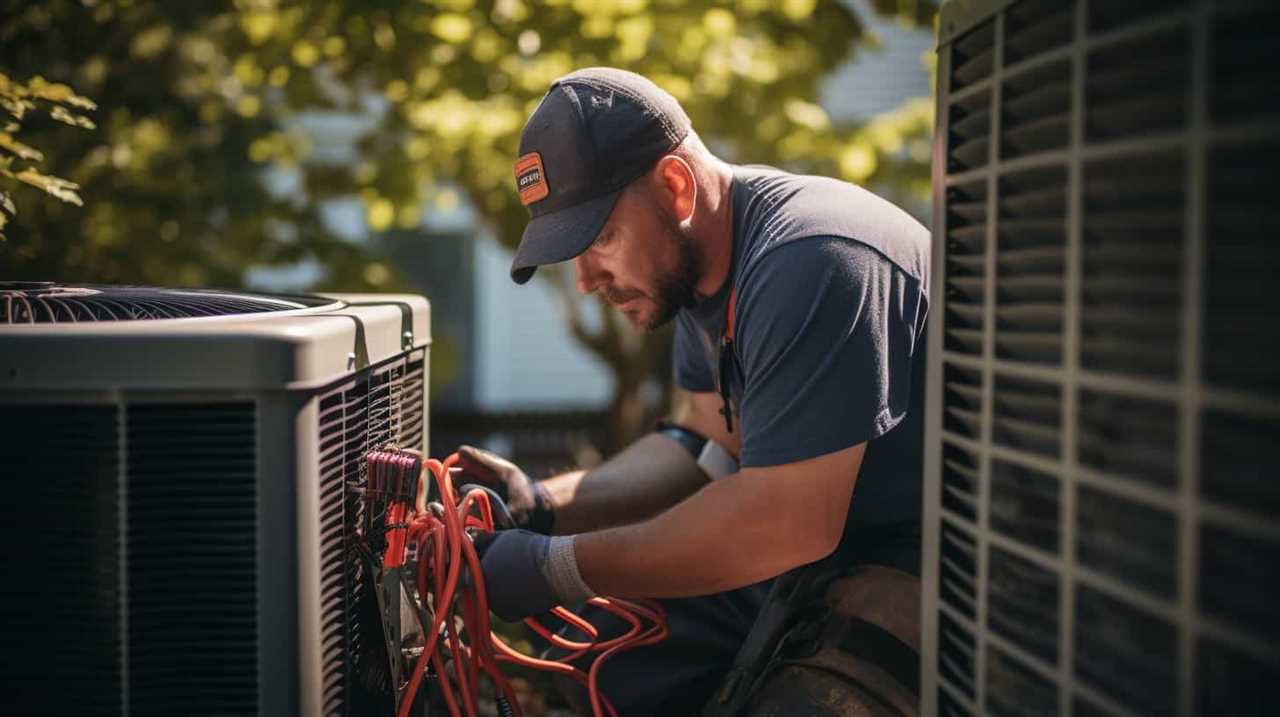
-
Economic Growth:
-
Renewable energy projects have the potential to stimulate economic growth by attracting investments and creating new business opportunities.
-
The renewable energy sector has been growing rapidly, with a significant increase in jobs and revenue generation.
-
Job Creation:
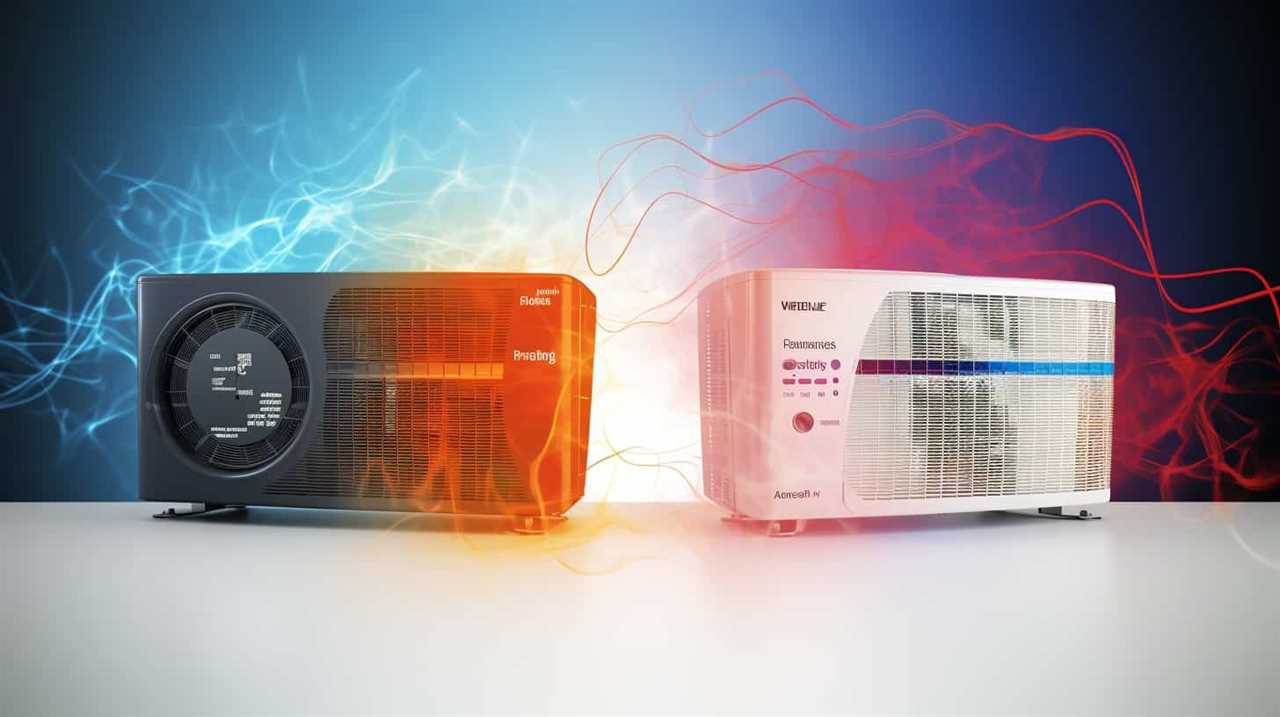
-
Transitioning to renewable heating systems can create a multitude of jobs, from manufacturing and installation to maintenance and operation.
-
A study by the International Renewable Energy Agency (IRENA) found that investing in renewable heating and cooling could create millions of jobs worldwide.
These economic advantages not only contribute to the sustainability of our planet but also foster innovation and prosperity in our communities. By embracing renewable energy for heating, we can pave the way for a greener future while reaping the benefits of economic growth and job creation.
Increased Energy Independence
Renewable energy sources increase our energy independence by reducing our reliance on fossil fuels. This transition to cleaner and more sustainable energy options offers numerous benefits, including increased energy security and reduced reliance on non-renewable resources.

By diversifying our energy mix with renewable sources such as solar, wind, and geothermal power, we can decrease our vulnerability to price fluctuations and supply disruptions in the fossil fuel market. Furthermore, renewable energy technologies have become more efficient and cost-effective over the years, making them increasingly competitive with traditional energy sources.
Investing in renewable energy not only helps to reduce greenhouse gas emissions and combat climate change but also strengthens our energy independence by promoting the use of local resources and fostering technological innovation in the energy sector.
Reduced Greenhouse Gas Emissions
We can achieve reduced greenhouse gas emissions by adopting renewable energy sources for heating. By transitioning to renewable energy solutions, we can significantly decrease our carbon footprint and contribute to a more sustainable future.
Here are two key ways in which sustainable heating options can help reduce greenhouse gas emissions:

-
Switching to renewable electricity: By using renewable energy sources such as solar or wind power to generate electricity for heating, we can eliminate the emissions associated with traditional fossil fuel-based electricity generation.
-
Utilizing biomass heating systems: Biomass heating systems utilize organic materials such as wood pellets, agricultural waste, or dedicated energy crops as fuel. These systems emit significantly fewer greenhouse gases compared to traditional fossil fuel heating systems.
Minimal Operational Maintenance
Our biomass heating systems require minimal operational maintenance. This not only saves time and effort but also contributes to energy savings and environmental benefits. By minimizing the need for frequent maintenance tasks, such as cleaning and servicing, our biomass heating systems ensure uninterrupted and efficient operation. This results in lower operational costs and increased energy efficiency.
To illustrate the minimal operational maintenance required, we have provided a table below:

| Maintenance Task | Frequency |
|---|---|
| Cleaning | Monthly |
| Servicing | Yearly |
| Fuel Delivery | As needed |
As you can see, the frequency of maintenance tasks is significantly reduced compared to traditional heating systems. This not only saves time and resources but also reduces the carbon footprint associated with maintenance activities. With our biomass heating systems, you can enjoy the benefits of renewable energy while minimizing the time and effort spent on operational maintenance.
Diverse Range of Renewable Energy Options
How can we explore the diverse range of renewable energy options available?
When it comes to heating options, there are several renewable energy sources to consider. Here are two sub-lists that highlight the variety of options:
- Solar Energy:
- Photovoltaic (PV) Panels: These panels convert sunlight into electricity, which can then be used for heating purposes.
- Solar Thermal Systems: These systems use sunlight to directly heat water or air for space heating.
- Geothermal Energy:
- Ground Source Heat Pumps: These pumps utilize the constant temperature of the earth to heat buildings.
- Geothermal Heat Exchange Systems: These systems transfer heat from the ground to a building using a network of pipes.
These diverse renewable energy options provide innovative solutions for heating needs while reducing environmental impact. By harnessing the power of the sun or the earth’s heat, we can achieve sustainable heating practices and contribute to a greener future.
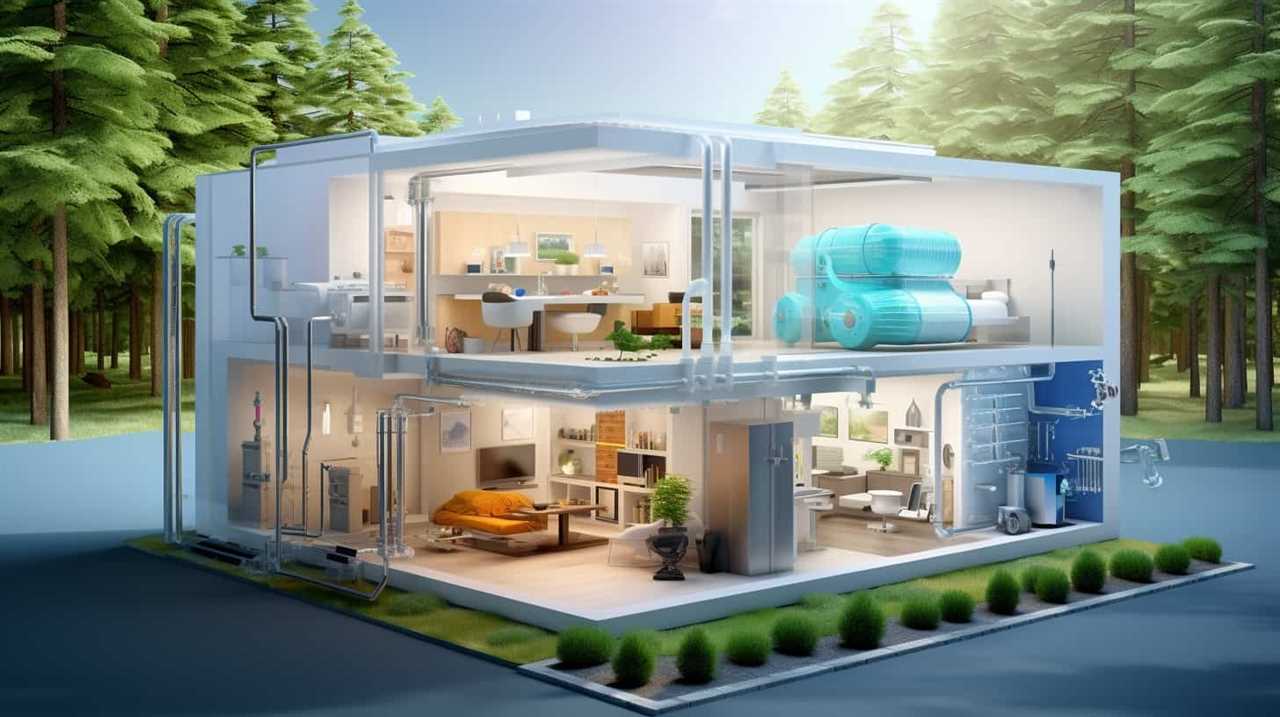
Potential for Government Incentives and Tax Credits
What government incentives and tax credits are available for utilizing renewable energy sources for heating? Government support for renewable energy incentives has been increasing in recent years, providing individuals and businesses with financial benefits for adopting renewable heating technologies. These incentives and tax credits aim to promote the use of renewable energy sources, reduce greenhouse gas emissions, and accelerate the transition to a sustainable energy future.
Here is a table outlining some of the current government incentives and tax credits available for utilizing renewable energy sources for heating:
| Incentive/Tax Credit | Description | Eligibility Criteria |
|---|---|---|
| Federal Investment Tax Credit (ITC) | Allows individuals and businesses to claim a percentage of the cost of installing renewable heating systems as a tax credit. | Available for solar thermal systems, geothermal heat pumps, and biomass heating systems. |
| State and Local Rebates | Many states and localities offer rebates to incentivize the installation of renewable heating systems. | Eligibility varies by location. Check with your local government for details. |
| Energy-Efficient Mortgages | These mortgages allow borrowers to finance energy-efficient improvements, including renewable heating systems, into their home loans. | Available for residential properties. Eligibility depends on lender requirements. |
These government incentives and tax credits can significantly reduce the upfront cost of adopting renewable heating technologies, making them more accessible and financially viable for individuals and businesses. By taking advantage of these incentives, we can accelerate the adoption of renewable energy sources for heating and contribute to a greener and more sustainable future.
Enhanced Home Value
By installing renewable heating systems, we can increase our home’s value. Renewable energy sources not only provide sustainability and cost savings, but also enhance the aesthetics of our homes and increase their marketability.
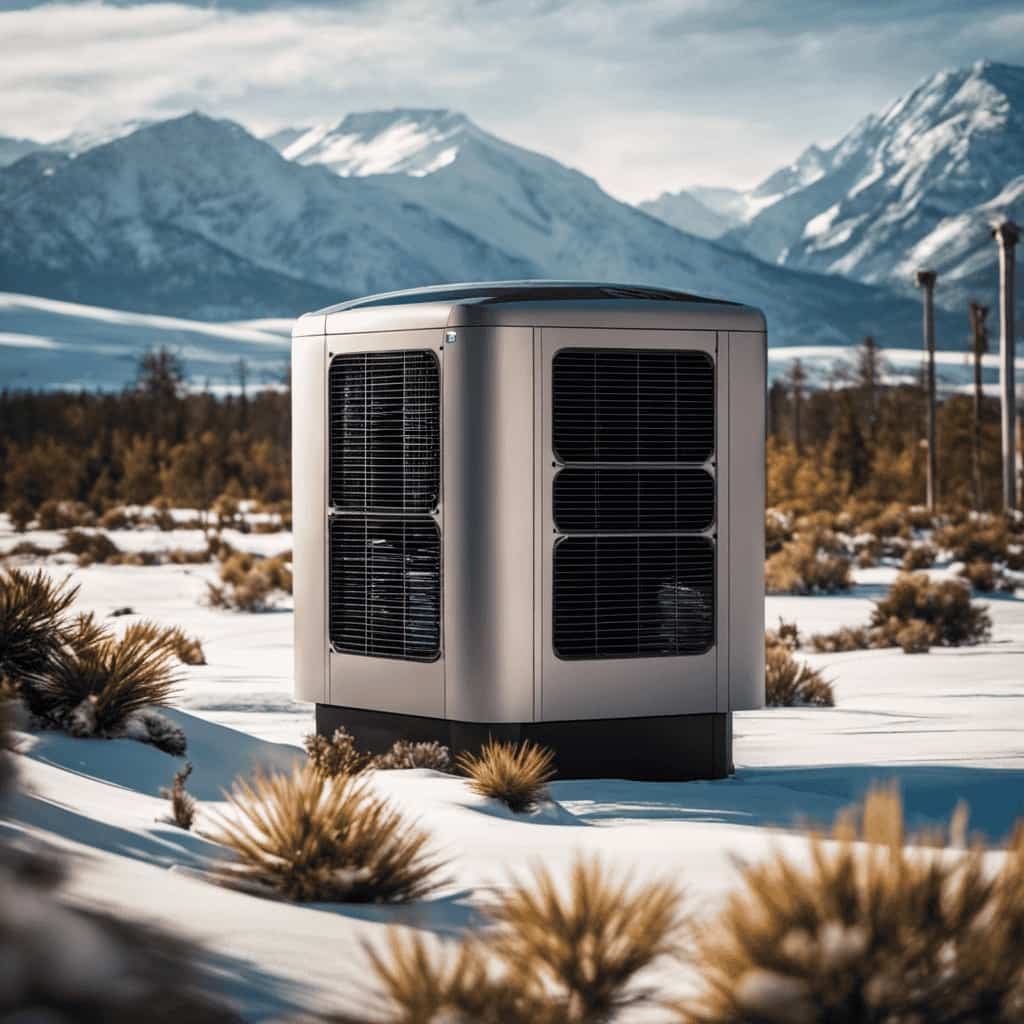
Here are two ways in which renewable heating systems contribute to enhancing home value:
-
Enhanced Aesthetics:
-
Solar panels on the roof: Solar panels not only harness the power of the sun, but they also add a modern and sleek look to our homes, increasing their curb appeal.
-
Geothermal heat pumps: These systems are hidden underground, leaving no visible equipment outside. This enhances the overall appearance of our homes and maintains a clean and uncluttered exterior.

-
Increased Marketability:
-
Growing demand for sustainable homes: With the increasing focus on sustainability and energy efficiency, homes equipped with renewable heating systems are in high demand, attracting environmentally conscious buyers.
-
Higher resale value: Homes with renewable heating systems have a competitive advantage in the real estate market, allowing homeowners to sell their properties at a higher price compared to those without such systems.
Frequently Asked Questions
How Does Heating With Renewable Energy Sources Contribute to Enhanced Home Value?
Heating with renewable energy sources enhances home value by providing enhanced comfort and decreasing carbon footprint. It’s an innovative solution that not only benefits the environment but also adds value to your property.

Are There Any Potential Government Incentives and Tax Credits Available for Switching to Renewable Energy Heating?
Yes, there are potential government incentives and tax credits available for switching to renewable energy heating. These incentives and credits can help offset the costs and make the transition to renewable energy more affordable for homeowners.
What Are the Different Renewable Energy Options Available for Heating?
Geothermal heating and biomass heating are two renewable energy options available for heating. They provide a sustainable and environmentally friendly way to heat our homes and reduce our carbon footprint.
What Is the Long-Term Cost Savings Associated With Heating Using Renewable Energy Sources?
Long term energy savings and environmental sustainability are key benefits of heating with renewable energy sources. By utilizing renewable energy, we can reduce our reliance on fossil fuels and decrease our carbon footprint, ultimately leading to a more sustainable future.
How Does Heating With Renewable Energy Sources Decrease Environmental Impact Compared to Traditional Heating Methods?
Heating with renewable energy sources decreases environmental impact compared to traditional methods. It reduces carbon emissions and improves energy efficiency. These benefits align with our desire for innovation and contribute to a greener future.

Conclusion
In conclusion, heating with renewable energy sources offers a multitude of green benefits. By reducing carbon emissions and increasing energy efficiency, we can lower energy costs and create a sustainable future.
With minimal maintenance required and a diverse range of renewable energy options available, we can reduce our dependence on fossil fuels. Additionally, government incentives and tax credits provide further motivation to adopt renewable energy.
Embracing this change not only benefits the environment but also enhances the value of our homes.
Renewable Energy Sources
10 Incredible Benefits of Energy-Saving Heat Pumps for Sustainable Living

Hi there! Have you ever thought about how you can live a more sustainable lifestyle and also save money? We have some exciting news to share with you.
In this article, we’re going to dive into the incredible benefits of energy-saving heat pumps for sustainable living. These amazing devices not only help reduce your carbon footprint, but also improve indoor air quality, offer versatile heating and cooling options, and come with government incentives and rebates.
Get ready to transform your home into an eco-friendly haven!
Key Takeaways
- Energy-saving heat pumps significantly reduce energy consumption and lower greenhouse gas emissions.
- Heat pumps can save a significant amount of money on energy bills and have a longer lifespan, resulting in fewer repair and replacement costs.
- Various energy efficiency incentives, such as tax credits and rebates, can reduce upfront costs and contribute to long-term financial benefits.
- Energy-saving heat pumps improve indoor air quality, provide personalized comfort, and operate quietly, enhancing the overall living environment.
Energy Efficiency
We believe that energy efficiency is a key factor in achieving sustainable living. It’s crucial for us to adopt energy-saving technologies that not only reduce our carbon footprint but also help us save on energy costs. Energy-saving technology plays a pivotal role in creating a sustainable future for us and the generations to come.
One of the most effective energy-saving technologies available today is the use of heat pumps. These innovative devices utilize renewable energy sources to provide heating and cooling for residential and commercial buildings. Heat pumps work by transferring heat from one area to another, rather than generating heat through combustion. This process makes them highly energy-efficient and environmentally friendly.
By utilizing heat pumps, we can significantly reduce energy consumption and lower greenhouse gas emissions. These systems are designed to operate at high efficiency levels, ensuring that we make the most of the energy we use. They also have the potential to save us a significant amount of money on our energy bills, making them a worthwhile investment.
Cost Savings
When it comes to the cost savings of energy-saving heat pumps, there are three key points to consider.
Firstly, these heat pumps can significantly lower your utility bills by reducing energy consumption.
Secondly, they offer long-term financial benefits as they’ve a longer lifespan compared to traditional heating systems, resulting in fewer repair and replacement costs.
Lastly, there are various energy efficiency incentives available, such as tax credits and rebates, that can further reduce the upfront costs of installing a heat pump.
Lower Utility Bills
By regularly using energy-saving heat pumps, we can significantly reduce our utility bills and save money in the long run. Energy-saving heat pumps are a remarkable example of energy-saving technology that not only benefits our wallets but also has a positive environmental impact.
These heat pumps work by efficiently transferring heat from one place to another, using minimal energy in the process. Unlike traditional heating systems, which rely on burning fossil fuels, heat pumps extract heat from the air, ground, or water, making them highly efficient and eco-friendly.
This means that by investing in energy-saving heat pumps, we not only lower our utility bills but also reduce our carbon footprint, contributing to a sustainable future. With lower utility bills and a reduced environmental impact, energy-saving heat pumps are an excellent choice for those who desire to serve others while living sustainably.
Long-Term Financial Benefits
Regularly utilizing energy-saving heat pumps can significantly reduce our long-term costs, providing us with financial benefits over time. When it comes to financial planning and investment strategies, these cost savings are worth considering.
Here are four reasons why energy-saving heat pumps are a smart long-term investment:
-
Lower energy bills: Energy-saving heat pumps are designed to use less energy, resulting in lower monthly utility bills. This means more money in our pockets to allocate towards other expenses or savings.
-
Increased home value: Installing energy-saving heat pumps can increase the value of our homes. Potential buyers appreciate energy-efficient features, which can give us a competitive advantage when selling our property.
-
Tax incentives: Many governments offer tax incentives or rebates for installing energy-saving heat pumps. These financial incentives can help offset the initial cost of installation and reduce our overall investment.
-
Reduced maintenance and repair costs: Energy-saving heat pumps are built to be durable and require less maintenance compared to traditional heating systems. This means fewer expenses on repairs and replacements in the long run.
Investing in energy-saving heat pumps not only benefits our wallets but also contributes to a sustainable future.
Energy Efficiency Incentives
One of the major advantages of energy-saving heat pumps is the potential for cost savings through various energy efficiency incentives. By taking advantage of energy efficiency programs and energy-saving initiatives, homeowners can significantly reduce their energy bills and save money in the long run. These incentives can come in the form of tax credits, rebates, or grants that help offset the initial cost of purchasing and installing a heat pump system. To give you a better idea of the potential savings, here is a table illustrating the average cost savings for different types of energy efficiency incentives:
| Energy Efficiency Incentive | Average Cost Savings |
|---|---|
| Tax Credits | $500 – $1,000 |
| Rebates | Up to 30% |
| Grants | Varies |
Reduced Carbon Footprint
With the use of energy-saving heat pumps, we can significantly reduce our carbon footprint. These innovative systems contribute to the success of carbon reduction initiatives and have a positive environmental impact. Here are four reasons why investing in energy-saving heat pumps is a sustainable choice:
-
Energy Efficiency: Heat pumps are highly efficient, converting energy from the air or ground into heat for our homes. By utilizing renewable energy sources, they reduce our reliance on fossil fuels, thus decreasing carbon emissions.
-
Reduced Greenhouse Gas Emissions: Traditional heating and cooling systems contribute to greenhouse gas emissions, exacerbating climate change. Energy-saving heat pumps emit significantly fewer greenhouse gases, helping to mitigate the environmental impact and protect our planet.
-
Long-Term Cost Savings: By choosing energy-saving heat pumps, we not only reduce our carbon footprint but also save money in the long run. These systems are highly efficient, resulting in lower energy bills and increased financial sustainability.
-
Improved Indoor Air Quality: Energy-saving heat pumps come with advanced filtration systems that remove pollutants, allergens, and contaminants from the air, providing healthier indoor environments. This promotes well-being and enhances the quality of life for ourselves and our loved ones.
By embracing energy-saving heat pumps, we can make a positive impact on the environment while enjoying the benefits of reduced energy consumption, lower costs, and improved indoor air quality.
Let’s take this opportunity to serve our planet and future generations by adopting sustainable heating and cooling solutions.
Improved Indoor Air Quality
As we invest in energy-saving heat pumps, we can enjoy improved indoor air quality due to their advanced filtration systems. These innovative systems are designed to filter out dust, allergens, and other pollutants from the air, ensuring that the air we breathe is clean and healthy. The air filtration capabilities of heat pumps can greatly benefit our overall well-being and contribute to a healthier living environment.
One of the main health benefits of improved indoor air quality is the reduction in respiratory problems. By removing airborne particles, such as dust and pollen, from the air, heat pumps can help alleviate symptoms of allergies and asthma. This is particularly important for individuals who are sensitive to these allergens, as it can greatly improve their quality of life.
Additionally, the advanced filtration systems in energy-saving heat pumps can also help reduce the spread of airborne viruses and bacteria. This is crucial in maintaining a healthy home, especially during flu seasons or when someone in the household is sick. By removing these harmful particles from the air, heat pumps can help prevent the transmission of illnesses and keep our loved ones safe.
Versatility in Heating and Cooling
When it comes to versatility in heating and cooling, energy-saving heat pumps offer a wide range of options to suit our specific needs and preferences. These innovative systems have revolutionized the way we regulate the temperature in our homes, providing us with comfort and efficiency all year round.
Here are four remarkable features of energy-saving heat pumps that highlight their versatility in installation and the latest energy-saving technology advancements:
-
Flexible installation options: Energy-saving heat pumps can be installed in various locations within our homes, including walls, floors, and ceilings. This versatility allows us to maximize space and integrate the system seamlessly into our existing setup.
-
Dual functionality: Energy-saving heat pumps are designed to provide both heating and cooling capabilities, eliminating the need for separate systems. This not only saves us money but also reduces our carbon footprint by utilizing a single energy-efficient device.
-
Zoning capabilities: With energy-saving heat pumps, we can create customized zones within our homes, allowing us to control the temperature in different areas independently. This feature enhances comfort and energy efficiency, as we can adjust the heating or cooling based on our specific needs in each zone.
-
Smart technology integration: Energy-saving heat pumps can be integrated with smart home technology, enabling us to control and monitor the system remotely. This feature provides convenience and allows us to optimize energy usage even when we’re away from home.
Long Lifespan
Our energy-saving heat pumps have a lifespan of up to 15 years, ensuring long-lasting performance and reliability for our sustainable living needs. The durability and extended lifespan of these energy-efficient heat pumps make them a cost-effective choice for reducing utility bills and providing long-term financial advantages. By incentivizing energy efficiency, governments are actively encouraging the use of energy-saving heat pumps to decrease carbon emissions and improve indoor air quality.
One of the key benefits of our energy-saving heat pumps is their versatility in providing both heating and cooling solutions. This versatility allows for year-round comfort in any climate. Additionally, these heat pumps operate quietly, reducing noise pollution and creating a peaceful environment.
Maintenance is minimal with our heat pumps, further enhancing their appeal. This means less time and money spent on upkeep, allowing homeowners to enjoy the benefits of reduced energy consumption and enhanced comfort.
To further support the adoption of energy-saving heat pumps, governments offer various incentives and rebates. These financial benefits make sustainable home upgrades more accessible and affordable, ultimately contributing to a greener future.
With their extended lifespan, energy efficiency, and government support for efficiency, our energy-saving heat pumps are a reliable and sustainable choice for homes and businesses alike.
Quiet Operation
When it comes to energy-saving heat pumps, one of the incredible benefits is their quiet operation. These heat pumps are designed to reduce noise, providing a peaceful and quiet environment in your home.
With their silent operation, you can enjoy the comfort of a heat pump without any disruptive sounds.
Noise Reduction Advantages
One of the major advantages of energy-saving heat pumps is their ability to reduce noise, providing a quieter operation for sustainable living.
When considering soundproofing solutions for your home, heat pumps offer several benefits that contribute to a peaceful and quiet environment:
-
Improved acoustics optimization: Heat pumps are designed with advanced technology to minimize noise levels, ensuring a calm and serene atmosphere in your home.
-
Enhanced comfort: With reduced noise, you can enjoy a more relaxing and stress-free living space, promoting overall well-being and tranquility.
-
Increased productivity: A quiet environment fosters concentration and productivity, allowing you to focus on your work or leisure activities without distractions.
-
Better sleep quality: The noise reduction provided by energy-saving heat pumps promotes a restful sleep, helping you wake up refreshed and rejuvenated each morning.
Peaceful and Quiet Operation
We can enjoy a calm and serene environment with the peaceful and quiet operation of energy-saving heat pumps. These innovative systems are designed to minimize noise and provide a peaceful experience for homeowners. By using advanced technology and soundproofing materials, energy-saving heat pumps effectively reduce noise levels, allowing you to relax and unwind without any disturbances. The noise reduction feature is particularly beneficial for those living in urban areas, where external noise pollution can be a constant source of irritation. With energy-saving heat pumps, you can create a tranquil living space and enjoy a peaceful operation that enhances your overall well-being. Now, let’s delve into the subsequent section to explore the additional benefits of silent heat pumps.
| Column 1 | Column 2 | Column 3 | Column 4 |
| Benefit | Energy Efficient | Eco-Friendly | Cost-Effective |
| ———- | —————— | ———— | —————— |
| Quiet | Yes | Yes | Yes |
| ———- | —————— | ———— | —————— |
Silent Heat Pump Benefits
Our silent heat pumps offer a noiseless and uninterrupted operation, ensuring a peaceful and serene atmosphere in your home. With our silent heat pump installation, you can enjoy the benefits of a quiet and comfortable living space. Here are some reasons why our silent heat pumps are the perfect choice for your home:
- Noise reduction techniques: Our heat pumps are designed with advanced noise reduction techniques, minimizing any operational sounds.
- Improved sleep quality: Say goodbye to noisy disruptions during your sleep. Our silent heat pumps provide a tranquil environment for a restful night’s sleep.
- Enhanced relaxation: Experience ultimate relaxation in your home without the constant hum of traditional heating systems.
- Better focus and concentration: Enjoy a quiet and distraction-free environment, ideal for productivity and concentration.
By choosing our silent heat pumps, you can create a peaceful oasis in your home, free from the noise and disturbances of conventional heating systems.
Now let’s explore the minimal maintenance requirements of our energy-saving heat pumps.
Minimal Maintenance Requirements
With proper installation and regular professional servicing, heat pumps have minimal maintenance requirements. This makes them a cost-effective choice for homeowners who desire an energy-efficient and sustainable living environment.
Unlike traditional heating and cooling systems, heat pumps are designed to be low-maintenance, providing easy upkeep for busy individuals or families.
One of the main reasons why heat pumps require minimal maintenance is because they’ve fewer moving parts compared to other HVAC systems. This reduces the likelihood of mechanical failures and the need for frequent repairs. Additionally, heat pumps are typically installed indoors, protecting them from harsh weather conditions that could cause damage.
To ensure optimal performance and longevity, it’s recommended to schedule regular professional servicing for your heat pump. This includes cleaning or replacing air filters, checking refrigerant levels, and inspecting electrical connections. By investing in routine maintenance, you can prevent potential issues and extend the lifespan of your heat pump, ultimately saving you money in the long run.
In conclusion, heat pumps offer a cost-effective maintenance solution for sustainable living. With proper installation and regular professional servicing, homeowners can enjoy the benefits of an energy-efficient system with minimal upkeep.
Now, let’s explore how heat pumps can enhance comfort levels in your home.
Enhanced Comfort Levels
To achieve enhanced comfort levels, homeowners can rely on energy-saving heat pumps for efficient heating and cooling throughout the year. These innovative systems offer a multitude of benefits that contribute to improved relaxation and optimized temperature control. Let’s explore some of these advantages:
-
Consistent and even heating: Energy-saving heat pumps distribute warm air evenly throughout your home, eliminating cold spots and ensuring a comfortable environment in every room.
-
Precise temperature control: With advanced thermostats and zoning capabilities, heat pumps allow you to customize the temperature settings for different areas of your home, providing personalized comfort for everyone.
-
Reduced noise levels: Heat pumps operate quietly, creating a peaceful and tranquil atmosphere in your living space. Say goodbye to noisy and disruptive heating and cooling systems.
-
Enhanced air quality: Heat pumps not only regulate temperature but also improve indoor air quality by effectively filtering out allergens, dust, and pollutants, promoting a healthier and cleaner living environment.
Government Incentives and Rebates
When it comes to adopting energy-saving heat pumps for sustainable living, government incentives and rebates play a crucial role.
These financial benefits can significantly offset the initial investment and make energy-efficient systems more affordable for homeowners.
Financial Benefits of Incentives
We have found that the financial benefits of incentives, such as government incentives and rebates, can be substantial for homeowners considering energy-saving heat pumps. These incentives not only help in reducing the initial cost of purchasing and installing a heat pump, but they also contribute to long-term savings on energy bills.
Here are four key financial benefits of these incentives:
-
Increased affordability: Government incentives make energy-saving heat pumps more affordable for homeowners, allowing them to invest in a sustainable heating and cooling solution without breaking the bank.
-
Lower operating costs: Energy-efficient heat pumps consume less energy, resulting in lower monthly utility bills. With government support, homeowners can enjoy significant savings on their energy expenses.
-
Return on investment: The cost savings achieved through reduced energy consumption can lead to a quicker return on investment for homeowners. This means that the initial investment in an energy-saving heat pump can pay for itself over time.
-
Environmental benefits: By incentivizing the adoption of energy-efficient heating systems, governments encourage sustainable living and contribute to the reduction of greenhouse gas emissions, thus protecting the planet for future generations.
Rebates for Sustainable Homes
Our article highlights the availability of government incentives and rebates that provide financial support for homeowners who choose to invest in sustainable homes, including energy-saving heat pumps. These incentives are part of a larger effort to promote sustainable construction and encourage the use of energy-efficient appliances.
By offering rebates, the government aims to make sustainable living more accessible and affordable for homeowners. These financial incentives can help offset the initial costs of installing energy-saving heat pumps and other energy-efficient appliances, making it easier for homeowners to make the switch to sustainable technology.
In addition to saving money on energy bills, homeowners can also benefit from these rebates, making it a win-win situation for both the environment and their wallets.
Take advantage of these government incentives and rebates to create a more sustainable and energy-efficient home.
Government Support for Efficiency
Government funding plays a crucial role in promoting energy efficiency by offering incentives and rebates to homeowners. These initiatives aim to encourage the adoption of sustainable practices and the use of energy-saving technologies. Here are four reasons why government support is essential for homeowners’ energy efficiency:
-
Financial relief: Government incentives and rebates provide financial assistance to homeowners, making energy-saving upgrades more affordable.
-
Increased affordability: With government funding, homeowners can access cost-effective energy-efficient products and services.
-
Environmental impact: Supporting energy efficiency reduces carbon emissions, helping to combat climate change and preserve the environment for future generations.
-
Job creation: Through policy implementation, government support for energy efficiency stimulates the growth of the green economy, creating job opportunities and fostering economic development.
Government incentives and rebates empower homeowners to make sustainable choices while contributing to a greener future for all.
Frequently Asked Questions
Can Heat Pumps Be Used in All Types of Homes, Including Older or Historic Buildings?
Yes, heat pumps can be used in all types of homes, including older or historic buildings. However, there are certain challenges and limitations to consider during installation.
Heat pump installation in older buildings may require modifications to the existing infrastructure, such as upgrading insulation or replacing outdated ductwork. Additionally, the size and layout of older buildings may affect the efficiency of heat pumps.
Despite these challenges, heat pumps can still provide significant energy savings and contribute to sustainable living in any type of home.
Are There Any Special Requirements or Considerations When Installing a Heat Pump in a Multi-Story Home?
When installing a heat pump in a multi-story home, there are some special considerations and installation requirements.
It’s important to assess the size and layout of the home to determine the best location for the heat pump unit and the distribution system.
Proper insulation and sealing of ducts are necessary to ensure optimal efficiency.
Additionally, it may be necessary to install multiple units or a zoning system to effectively heat and cool different areas of the home.
How Does the Energy Efficiency of Heat Pumps Compare to Other Heating and Cooling Options?
When comparing the energy efficiency of heat pumps to other heating and cooling options, we find that heat pumps are highly efficient and cost-effective.
A comprehensive cost effectiveness analysis reveals that heat pumps use significantly less energy to produce the same amount of heating or cooling compared to traditional systems. This not only saves money on utility bills but also reduces environmental impact.
Heat pumps are an excellent choice for sustainable living and reducing our carbon footprint.
Can Heat Pumps Be Used in Areas With Extreme Weather Conditions, Such as Very Cold Winters or Hot Summers?
In areas with extreme weather conditions, such as very cold winters or hot summers, heat pumps are remarkably adaptable. They provide cost-effective heating and cooling solutions, making them an excellent choice for sustainable living.
Despite the challenging weather, heat pumps efficiently regulate indoor temperatures, ensuring comfort all year round. Their energy-saving capabilities also help reduce utility costs and minimize environmental impact.
With their versatility and efficiency, heat pumps are a reliable option to combat extreme weather conditions while promoting sustainability.
Are There Any Potential Health Risks Associated With the Use of Heat Pumps, Such as Allergies or Respiratory Issues?
Potential health risks associated with heat pumps include allergies or respiratory issues. However, it’s essential to note that these risks are minimal when compared to traditional heating and cooling systems.
Heat pumps provide better indoor air quality by filtering and circulating fresh air. They don’t produce combustion gases or release harmful chemicals, making them safer for occupants.
The energy-saving efficiency of heat pumps also reduces the impact on the environment, making them a sustainable choice for a healthier and greener future.
Conclusion
In conclusion, energy-saving heat pumps are like the superheroes of sustainable living, fighting to save the planet and our wallets.
With their incredible efficiency, cost savings, and reduced carbon footprint, they bring comfort and cleaner air to our homes.
They’re versatile, quiet, and require minimal maintenance.
Plus, the government offers incentives and rebates to support their adoption.
By embracing heat pumps, we can create a greener, more sustainable future for generations to come.
Renewable Energy Sources
Understanding Renewable Energy’s Role in Heat Pump Efficiency

As enthusiasts of energy, we comprehend the crucial role that renewable energy plays in enhancing the efficiency of heat pumps. Through the incorporation of different renewable energy sources, we are able to maximize the performance of heat pumps and lessen our carbon footprint.
In this article, we will delve into the impact of renewable energy on heat pump systems, exploring different technologies and real-life case studies.
Join us on this informative journey as we uncover the potential of renewable energy in enhancing heat pump efficiency and creating a sustainable future.
Key Takeaways
- Renewable energy sources such as solar power, wind energy, and geothermal energy play a crucial role in enhancing the efficiency of heat pump systems.
- Incorporating renewable energy into heat pump systems reduces carbon footprint, lowers greenhouse gas emissions, and promotes a more sustainable future.
- Different renewable energy sources like solar power, wind energy, and geothermal energy offer clean and reliable options for powering heat pumps.
- The integration of renewable energy not only enhances heat pump performance and efficiency but also reduces reliance on traditional energy sources and enables higher levels of efficiency.
The Importance of Renewable Energy in Heat Pump Efficiency
We can’t underestimate the role of renewable energy in increasing heat pump efficiency.
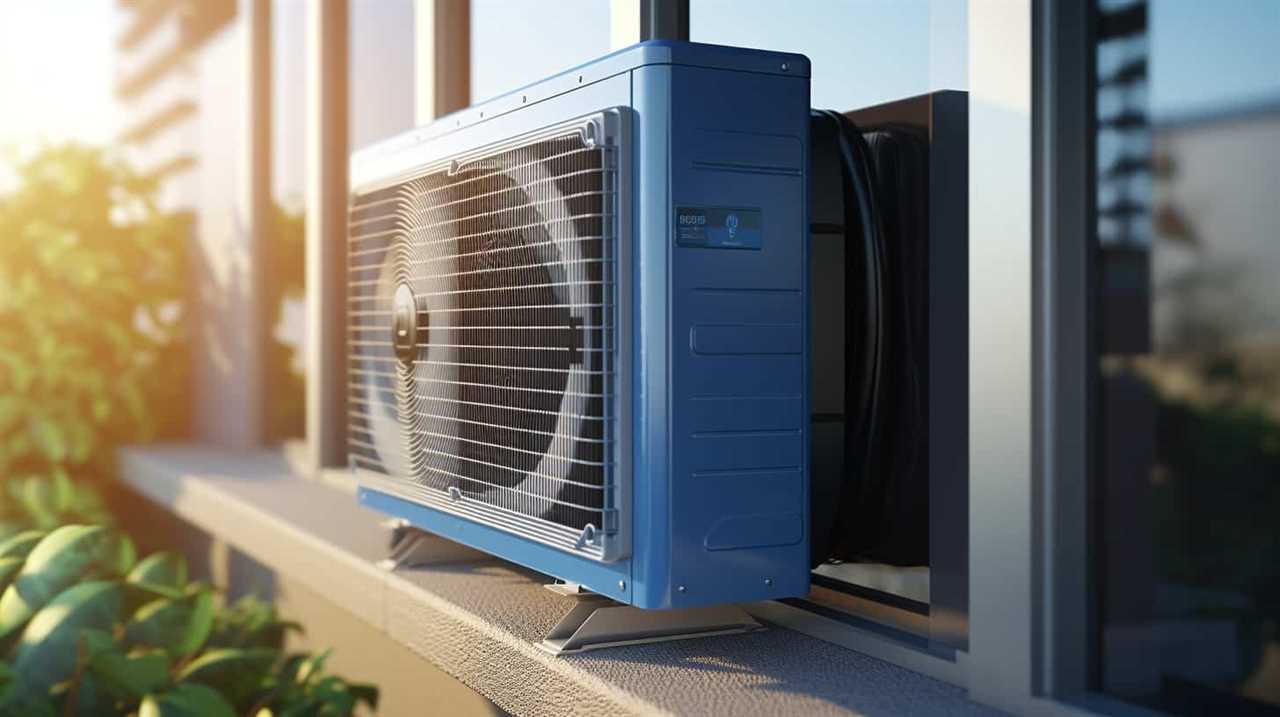
Renewable energy sources play a crucial role in enhancing the overall energy efficiency of heat pump systems. By utilizing renewable energy sources such as solar power, wind energy, and geothermal energy, we can significantly reduce the carbon footprint associated with traditional heating and cooling methods.
These renewable energy sources provide a sustainable and environmentally friendly alternative to fossil fuels, which are finite and contribute to climate change. Incorporating renewable energy into heat pump systems not only helps in reducing greenhouse gas emissions but also lowers energy consumption and operating costs.
Exploring different renewable energy sources for heat pump systems allows us to maximize the potential for energy efficiency and foster a more sustainable future.
Exploring Different Renewable Energy Sources for Heat Pump Systems
By considering different renewable energy sources, such as solar power, wind energy, and geothermal energy, we can expand our understanding of how to maximize heat pump system efficiency. Each of these energy sources has unique benefits and applications that can contribute to the overall efficiency of heat pump systems.
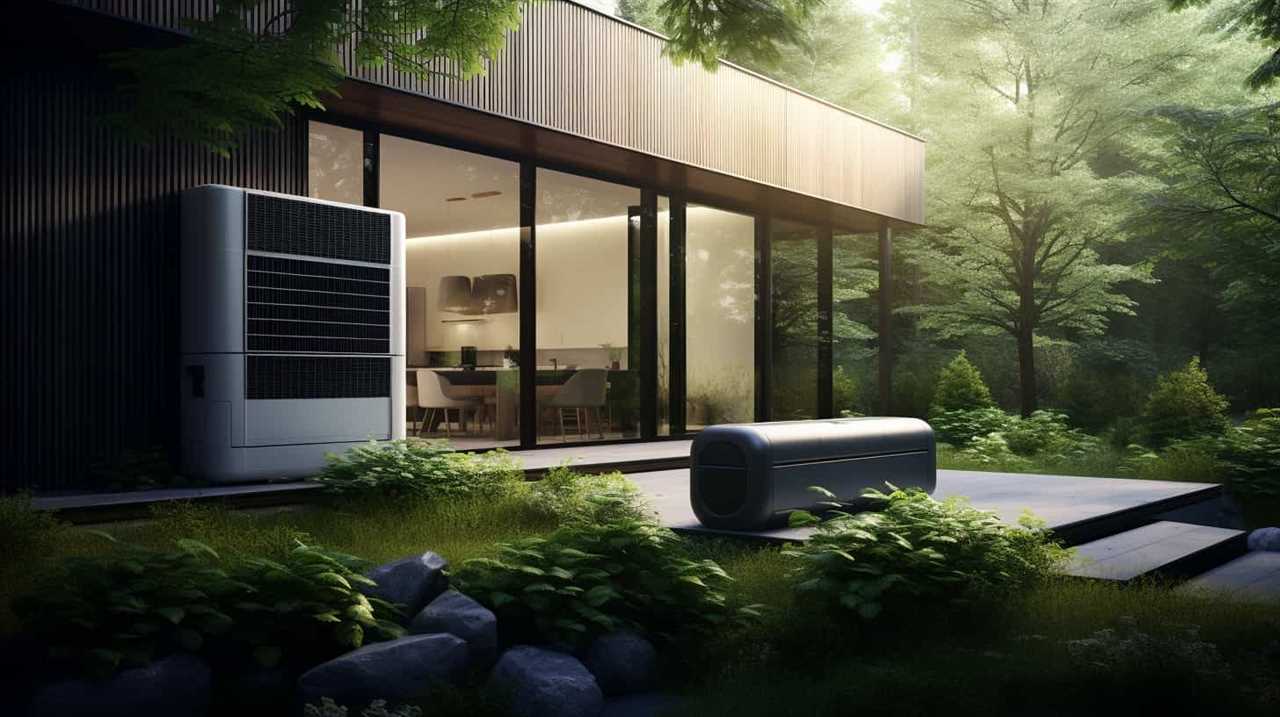
-
Solar power: Solar energy is abundant and can be harnessed through photovoltaic panels or solar thermal systems to provide electricity or heat for heat pumps. It’s a clean and sustainable source of energy that can significantly reduce reliance on traditional fossil fuels.
-
Wind energy: Wind turbines can generate electricity to power heat pumps. Wind energy is renewable and produces zero emissions, making it an environmentally friendly option for heat pump systems.
-
Geothermal energy: Geothermal heat pumps utilize the constant temperature of the earth to provide heating and cooling. This energy source is reliable, efficient, and can reduce energy consumption and greenhouse gas emissions.
Understanding the applications and benefits of these renewable energy sources is crucial in optimizing the efficiency of heat pump systems.
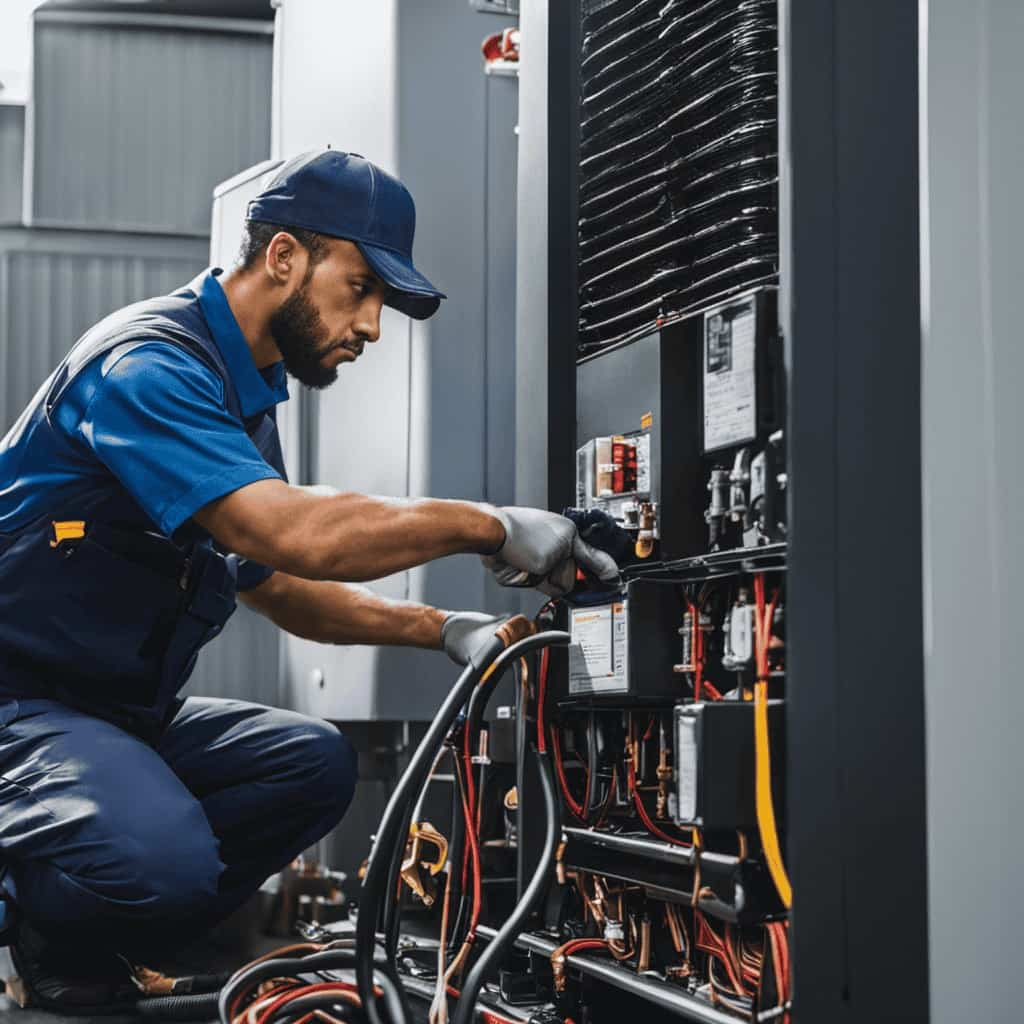
Understanding the Impact of Renewable Energy Integration on Heat Pump Performance
Integrating renewable energy sources with heat pump systems can significantly enhance their performance and efficiency. By harnessing renewable energy, such as solar or geothermal power, heat pumps can operate more efficiently and reduce their reliance on traditional energy sources. Renewable energy integration allows heat pumps to tap into a constant and abundant source of energy, reducing their overall energy consumption and carbon footprint.
When renewable energy is integrated into heat pump systems, it provides a stable and sustainable source of power. This not only ensures a more consistent and reliable operation but also enables heat pumps to achieve higher levels of efficiency. By utilizing renewable energy, heat pumps can operate at their optimal performance levels, delivering more heat or cooling output for the same amount of energy input.
Moreover, renewable energy integration can also enhance the overall system design and control strategies of heat pump systems. By incorporating intelligent control algorithms and monitoring technologies, heat pumps can better adapt to the available renewable energy resources, maximizing their performance and minimizing energy waste.
Maximizing Heat Pump Efficiency With Renewable Energy Technologies
To maximize heat pump efficiency, we can combine renewable energy technologies with heat pump systems. This integration offers several benefits and opportunities for commercial buildings. Here are some key points to consider:

- Renewable energy integration in commercial buildings:
- Solar panels: Harness the power of the sun to generate electricity for heat pumps.
- Wind turbines: Utilize wind energy to generate electricity and supplement heat pump operations.
- Geothermal systems: Tap into the earth’s natural heat to enhance heat pump efficiency.
- Biomass boilers: Use organic materials to produce heat and support heat pump functions.
- Hydroelectric power: Generate clean electricity from flowing water to power heat pumps.
Government incentives for renewable energy adoption in heat pump systems:
- Tax credits: Receive financial incentives for installing renewable energy systems.
- Grants and subsidies: Access funds to offset the upfront costs of renewable energy integration.
- Net metering: Sell excess electricity generated by renewable sources back to the grid.
Case Studies: Real-life Examples of Renewable Energy’s Effectiveness in Heat Pump Systems
We have gathered real-life case studies that demonstrate the effectiveness of renewable energy in heat pump systems. These examples showcase the practical applications of renewable energy technologies and highlight their cost effectiveness.
To provide a comprehensive overview, let’s examine a few of these case studies in detail.
| Case Study | Real Life Application | Cost Effectiveness |
|---|---|---|
| Study 1 | Residential Heating | High |
| Study 2 | Commercial Building | Medium |
| Study 3 | Industrial Process | Low |
| Study 4 | Agricultural Cooling | High |
| Study 5 | Municipal District | Medium |
In Study 1, a residential heating system integrated with solar panels demonstrated high cost effectiveness by significantly reducing electricity consumption. Similarly, Study 4 showcased the effectiveness of renewable energy in agricultural cooling, resulting in substantial cost savings for farmers. On the other hand, Study 3 revealed that while renewable energy was beneficial for an industrial process, the cost effectiveness was comparatively lower. These real-life examples highlight the potential of renewable energy in heat pump systems and emphasize the importance of considering specific applications and associated costs.

Frequently Asked Questions
How Do Heat Pumps Work?
Heat pumps work by transferring heat from one place to another using refrigerant. They are efficient because they can extract heat from the air, ground, or water. This technology offers numerous advantages, such as energy savings and reduced greenhouse gas emissions.
What Are the Benefits of Using Renewable Energy in Heat Pump Systems?
Using renewable energy in heat pump systems has several benefits. It reduces carbon emissions, contributing to a more sustainable future. Additionally, it lowers energy costs, making heat pumps a cost-effective and environmentally friendly choice for heating and cooling.
How Can Renewable Energy Sources Be Integrated Into Existing Heat Pump Systems?
Renewable energy integration into existing heat pump systems involves optimizing heat pump performance through the utilization of renewable energy sources. This process enhances efficiency, reduces reliance on fossil fuels, and promotes sustainability in heating and cooling operations.
Are There Any Government Incentives or Subsidies Available for Installing Renewable Energy Technologies in Heat Pump Systems?
There are government incentives and financing options available for installing renewable energy technologies in heat pump systems. These incentives help to offset the upfront costs and make renewable energy more accessible for homeowners and businesses.
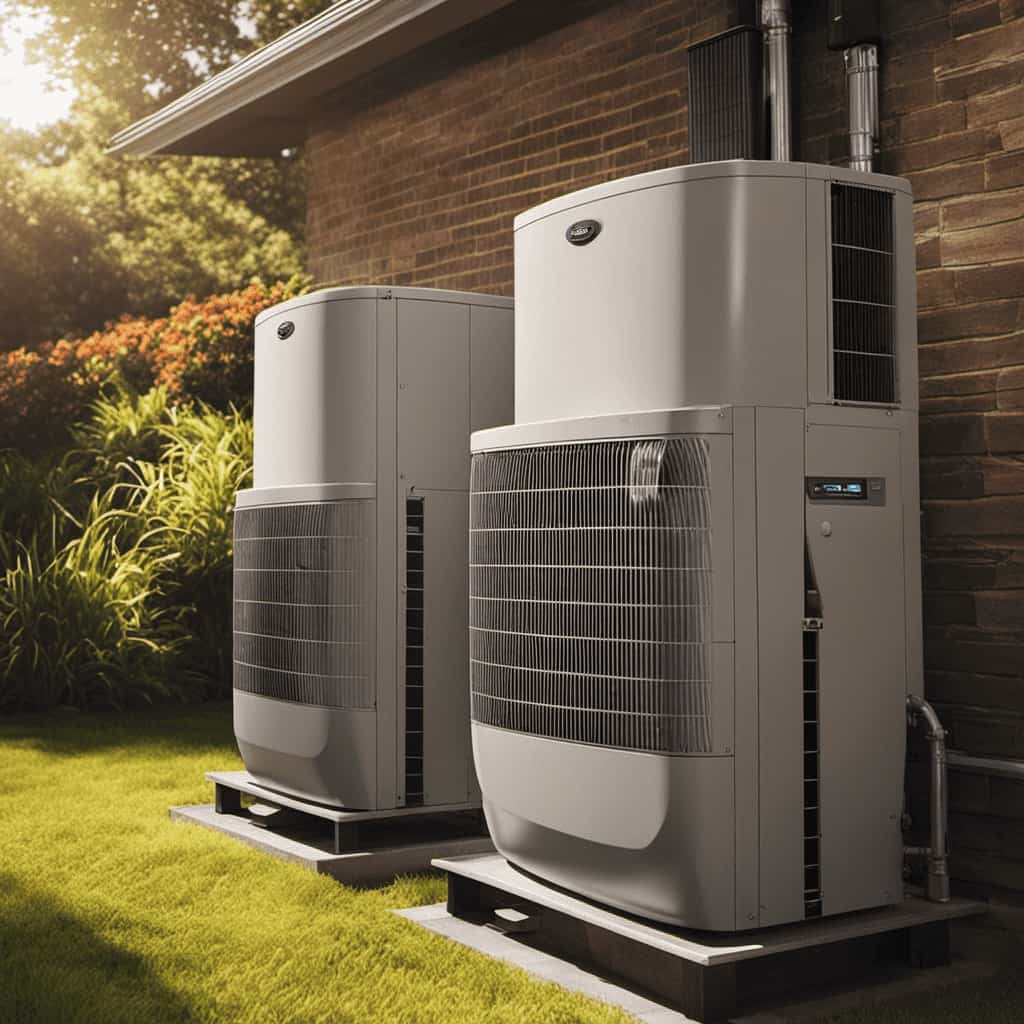
Can Renewable Energy Be Used to Power Heat Pumps in Cold Climates?
Yes, renewable energy can power heat pumps in cold climates. However, there are challenges like decreased efficiency and increased energy demand. We must optimize systems and integrate multiple renewable sources for effective residential heat pump operation.
Conclusion
In conclusion, the integration of renewable energy sources in heat pump systems is crucial for maximizing efficiency. By harnessing the power of renewable energy, such as solar or geothermal, heat pumps can operate at their full potential and reduce reliance on fossil fuels.
This not only benefits the environment by reducing carbon emissions, but also ensures sustainable and cost-effective heating solutions for homes and businesses.
The synergy between renewable energy and heat pump technology opens up a realm of possibilities for a greener future.

Renewable Energy Sources
Sustainable Buildings Embrace Heat Pump Efficiency With Love

In the United States, do we desire sustainable buildings that not only decrease our carbon emissions, but also prioritize the efficiency of heat pumps with care? Certainly!
In this article, we will explore the importance of maximizing heat pump efficiency in green buildings. We will delve into key factors and strategies for optimizing energy efficiency in sustainable construction.
By embracing heat pump efficiency, we can reap the benefits of reduced energy consumption and contribute to a greener, more sustainable future.
Let’s dive in and see how it’s done!
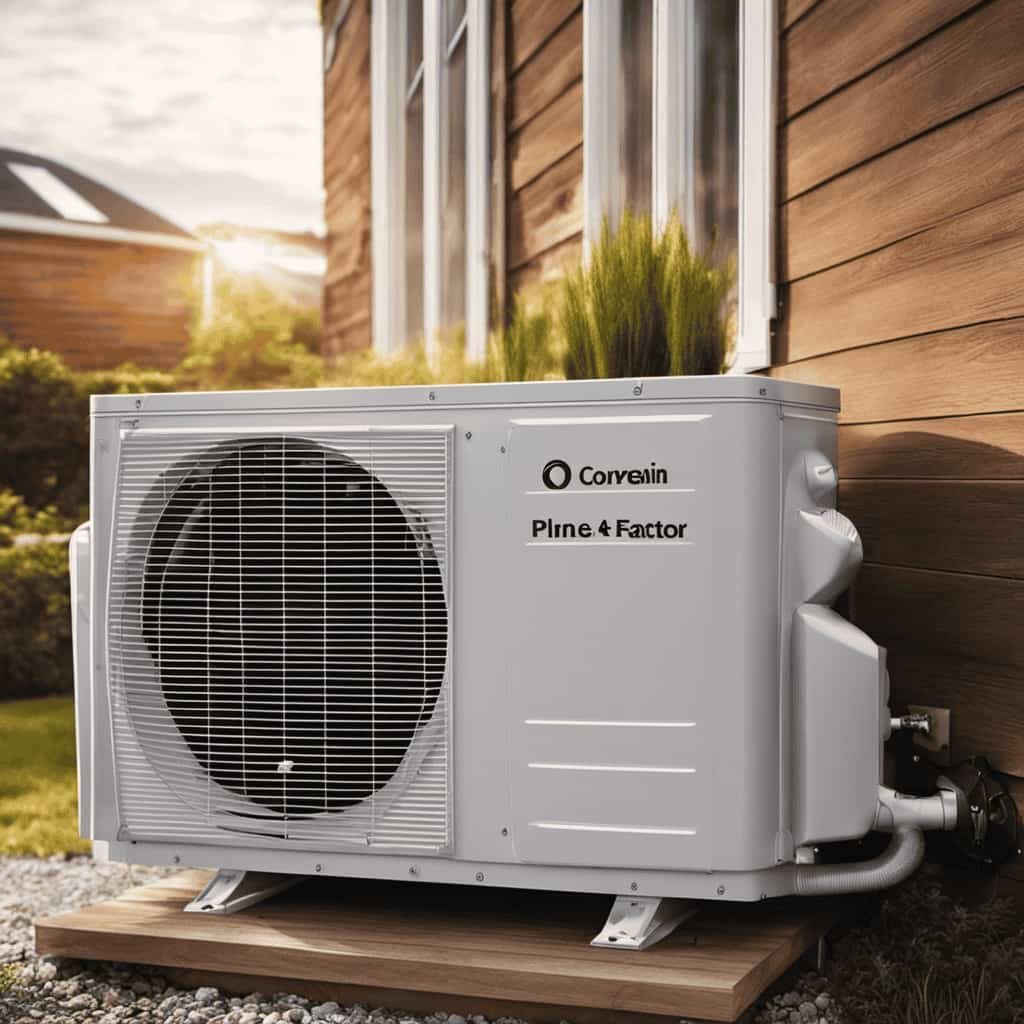
Key Takeaways
- Heat pump technology plays a significant role in achieving energy efficiency and reducing greenhouse gas emissions.
- Proper sizing, insulation, maintenance, and location optimization are crucial factors for maximizing heat pump efficiency in green buildings.
- Strategies to optimize heat pump energy efficiency include the use of smart technology, integration of renewable energy sources, proper design and placement, and efficient control systems.
- Embracing heat pump efficiency in sustainable building practices leads to cost savings, reduced carbon emissions, improved indoor comfort, and a more sustainable future.
The Importance of Heat Pump Efficiency in Sustainable Buildings
We believe optimizing heat pump efficiency is crucial for sustainable buildings.
Heat pump technology plays a significant role in achieving energy efficiency and reducing greenhouse gas emissions. By harnessing the principles of thermodynamics, heat pumps transfer heat from one location to another, making them an ideal choice for both heating and cooling purposes. They can extract heat from the air, ground, or water sources, making them versatile and adaptable in various climates.
The integration of renewable energy sources such as solar or geothermal further enhances the efficiency of heat pumps. Renewable energy integration allows heat pumps to operate using clean, sustainable power, minimizing reliance on fossil fuels. This not only reduces the carbon footprint of buildings but also contributes to the overall goal of achieving a greener and more sustainable future.
Key Factors for Maximizing Heat Pump Efficiency in Green Buildings
To maximize heat pump efficiency in green buildings, it’s important to consider key factors such as proper sizing, insulation, and regular maintenance. These factors play a crucial role in ensuring optimal performance and energy savings.
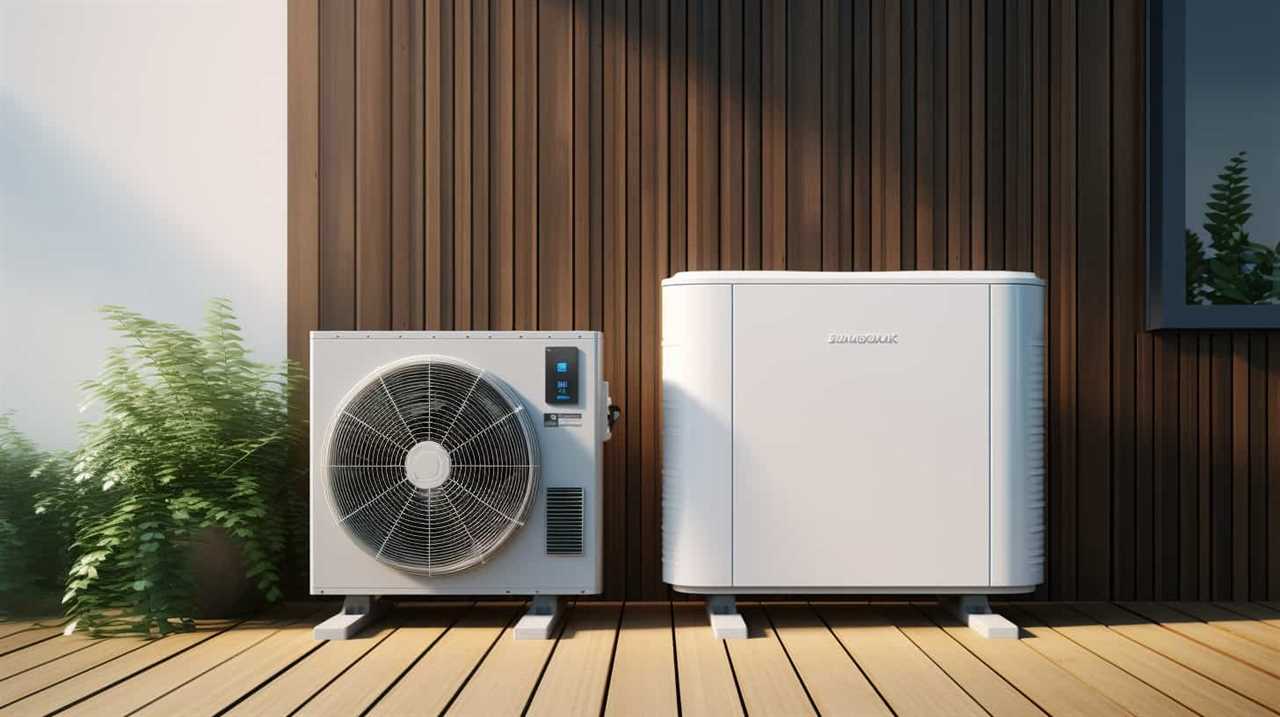
-
Proper sizing: Choosing the right size of heat pump is essential to ensure that it can meet the heating and cooling demands of the building efficiently. Undersized or oversized heat pumps can lead to energy wastage and reduced comfort.
-
Insulation: Good insulation helps minimize heat loss or gain, allowing the heat pump to operate more efficiently. Properly insulated walls, floors, and roofs create a well-insulated envelope, reducing the need for excessive heating or cooling.
-
Regular maintenance: Routine maintenance of heat pumps is vital to keep them running at peak efficiency. This includes cleaning or replacing filters, checking refrigerant levels, and ensuring proper airflow. Regular maintenance also extends the lifespan of the heat pump and prevents costly repairs.
Strategies to Optimize Heat Pump Energy Efficiency in Sustainable Construction
During the design and construction phase, our team focuses on implementing strategies that maximize heat pump energy efficiency in sustainable buildings. One key strategy we employ is the use of smart technology. By integrating advanced sensors and controls, we can optimize the performance of heat pump systems.

These sensors monitor various parameters such as temperature, humidity, and occupancy, allowing for precise adjustments to be made in real time.
Additionally, we prioritize the use of renewable energy sources to power heat pumps. This includes harnessing solar energy through photovoltaic panels or utilizing geothermal energy through ground-source heat pumps. By relying on clean and sustainable energy sources, we can further enhance the overall energy efficiency of our heat pump systems.
Through the combination of smart technology and renewable energy sources, we’re able to achieve maximum energy efficiency in sustainable construction.
Benefits of Embracing Heat Pump Efficiency in Green Building Practices
Maximizing heat pump efficiency in green building practices offers numerous benefits, including reduced energy consumption and lower carbon emissions. Embracing this strategy can lead to a more sustainable future by creating buildings that aren’t only environmentally friendly but also economically viable.

Here are some key benefits of embracing heat pump efficiency in green building practices:
-
Cost savings: Heat pumps are highly efficient and can significantly reduce energy consumption, resulting in lower utility bills for building owners.
-
Environmental impact: By using heat pumps, buildings can reduce their reliance on fossil fuels, leading to a decrease in carbon emissions and a positive impact on climate change.
-
Comfort and indoor air quality: Heat pumps provide consistent and comfortable heating and cooling, improving the overall comfort and well-being of occupants.

Transitioning into the next section, let’s now explore some case studies that highlight the successful implementation of heat pump efficiency in sustainable buildings.
Case Studies: Successful Implementation of Heat Pump Efficiency in Sustainable Buildings
We have seen successful implementation of heat pump efficiency in sustainable buildings through various case studies.
These case studies provide valuable insights into the benefits and challenges of incorporating heat pump technology in green building practices.
One such case study is the Bullitt Center in Seattle, which achieved net-zero energy status by utilizing ground-source heat pumps for heating and cooling. The heat pumps extract heat from the ground during winter and reject heat into the ground during summer, resulting in significant energy savings.
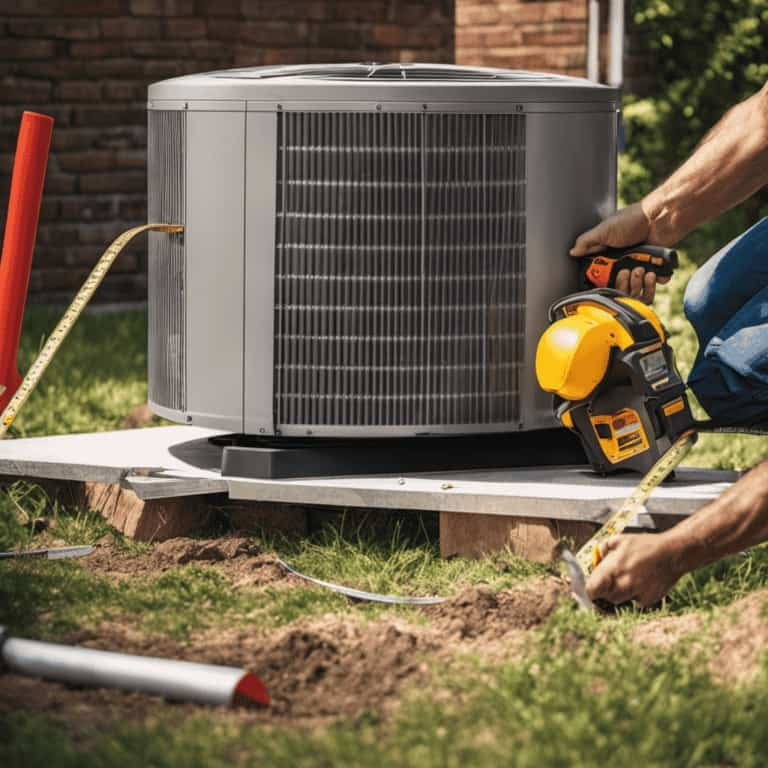
Another successful implementation can be seen in the King County Library System’s Carnation Library, where geothermal heat pumps were used to heat and cool the building.
These case studies demonstrate the potential of heat pump technology to reduce energy consumption and enhance the sustainability of buildings.
Frequently Asked Questions
How Do Heat Pumps Contribute to Overall Energy Efficiency in Sustainable Buildings?
Heat pumps contribute to overall energy efficiency in sustainable buildings by harnessing heat from the air or ground and transferring it indoors. This technology reduces reliance on fossil fuels, decreases emissions, and provides heating and cooling with optimal efficiency.
What Are the Potential Drawbacks or Limitations of Using Heat Pumps for Heating and Cooling in Green Buildings?
Potential drawbacks and limitations of heat pumps in green buildings include higher upfront costs, the need for adequate insulation, and limitations in extreme climates. However, proper design, maintenance, and integration with renewable energy can mitigate these concerns.
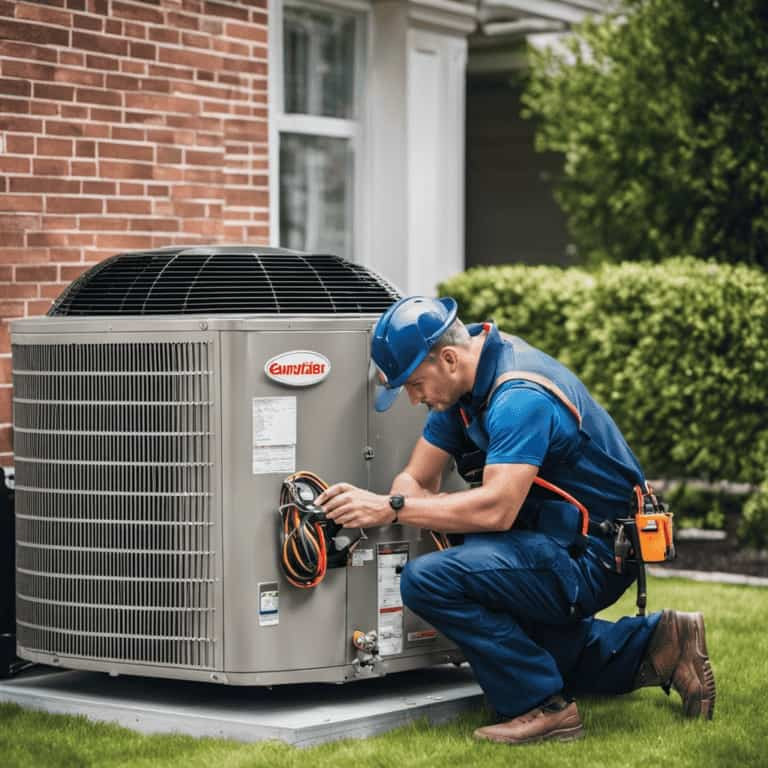
Are There Any Specific Maintenance Requirements or Considerations for Heat Pump Systems in Sustainable Construction?
Maintenance requirements and considerations for heat pump systems in sustainable construction include regular filter cleaning, annual professional inspections, and proper insulation to minimize energy loss. These measures ensure optimal performance and longevity of the system.
Can Heat Pumps Be Integrated With Renewable Energy Sources to Further Enhance Their Efficiency and Sustainability?
Yes, heat pumps can be integrated with renewable energy sources to enhance their efficiency and sustainability. However, there are integration challenges that need to be addressed, and future advancements are needed to fully optimize this integration.
Are There Any Government Incentives or Programs Available to Support the Implementation of Heat Pump Technology in Sustainable Buildings?
There are several government incentives and programs available to support the implementation of heat pump technology in sustainable buildings. These initiatives provide financial support and encourage the adoption of energy-efficient heating and cooling systems.
Conclusion
In conclusion, embracing heat pump efficiency in sustainable buildings is a crucial step towards a greener future.
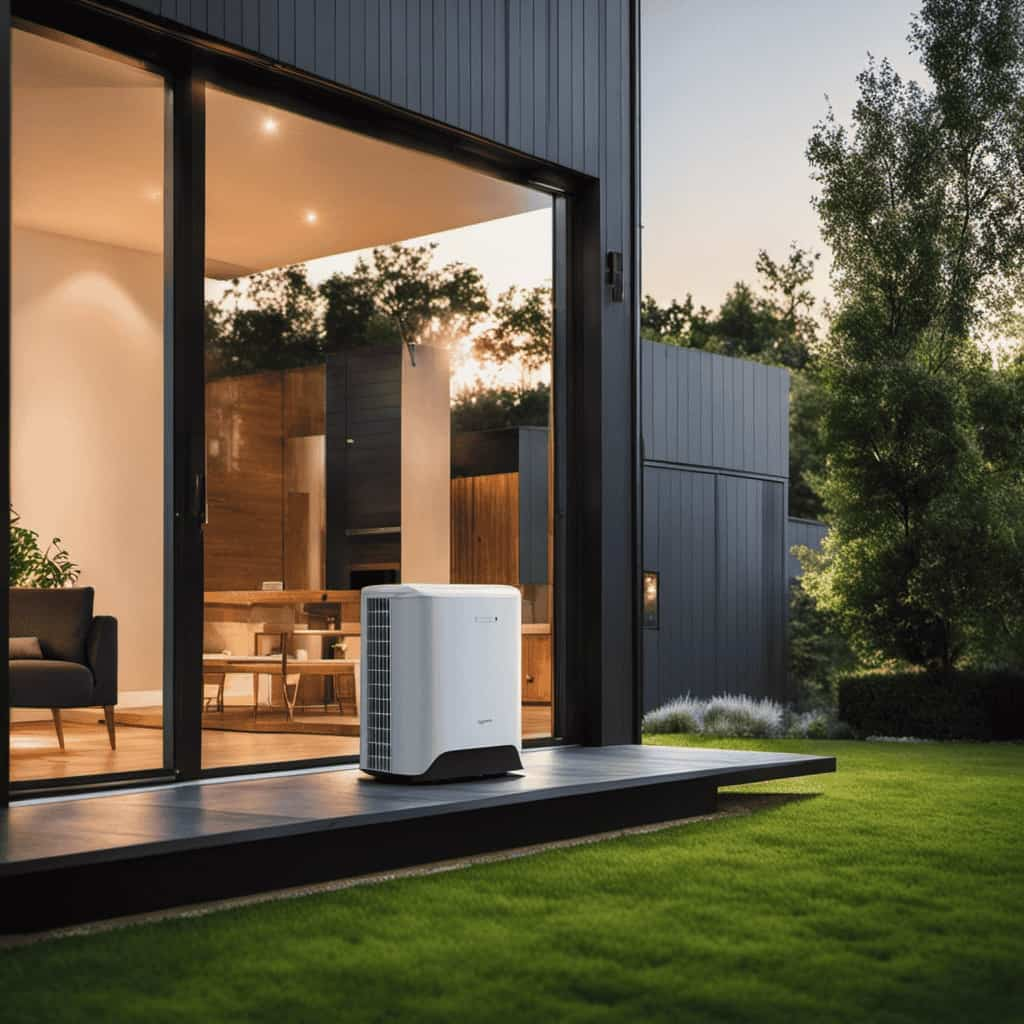
While some may argue that the initial costs of implementing heat pump systems can be high, the long-term benefits far outweigh the investment.
With increased energy efficiency and reduced carbon emissions, these buildings not only contribute to a healthier environment but also provide long-term cost savings.
By embracing this technology, we can create a sustainable and comfortable living environment for future generations.
-

 Residential and Commercial Applications2 months ago
Residential and Commercial Applications2 months agoBest Amana Heat Pump Reviews
-

 Thermal Energy Transfer2 months ago
Thermal Energy Transfer2 months agoBreakthroughs in Modern Heat Pump Systems: Thermal Energy Edition
-

 Residential and Commercial Applications2 months ago
Residential and Commercial Applications2 months agoBest Heat Pump
-

 Geothermal Heat Pumps4 weeks ago
Geothermal Heat Pumps4 weeks agoUpgrade Your Comfort with Our Efficient HVAC Systems
-

 Geothermal Heat Pumps1 month ago
Geothermal Heat Pumps1 month agoInnovative Geothermal Heat Pump Manufacturers Revolutionize Energy Efficiency
-

 Air Conditioning7 days ago
Air Conditioning7 days agoExploring Energy-Efficient Air Conditioning Heat Pumps
-

 Thermal Energy Transfer3 months ago
Thermal Energy Transfer3 months agoBoost Your Heat Pump Efficiency: Interactive Guide
-

 Residential and Commercial Applications2 months ago
Residential and Commercial Applications2 months agoBest Portable Heat Pump Heat & AC











